Search Result
Results for "
C3 Inhibitors
" in MedChemExpress (MCE) Product Catalog:
22
Isotope-Labeled Compounds
| Cat. No. |
Product Name |
Target |
Research Areas |
Chemical Structure |
-
- HY-P1036
-
|
|
Complement System
|
Others
|
|
Compstatin, a 13-residue cyclic peptide, is a potent inhibitor of the complement system C3 with species specificity. Compstatin binds to baboon C3 and is resistant to proteolytic cleavage in baboon blood (similar to humans). Compstatin inhibits only the activation of primates’ complement system. Compstatin exhibits IC50 values of 63 μM and 12 μM for classical and alterative complement pathway, respectively .
|
-

-
- HY-P1036A
-
|
|
Complement System
|
Others
|
|
Compstatin TFA, a 13-residue cyclic peptide, is a potent inhibitor of the complement system C3 with species specificity. Compstatin TFA binds to baboon C3 and is resistant to proteolytic cleavage in baboon blood (similar to humans). Compstatin TFA inhibits only the activation of primates’ complement system. Compstatin TFA exhibits IC50 values of 63 μM and 12 μM for classical and alterative complement pathway, respectively .
|
-

-
- HY-155716
-
-
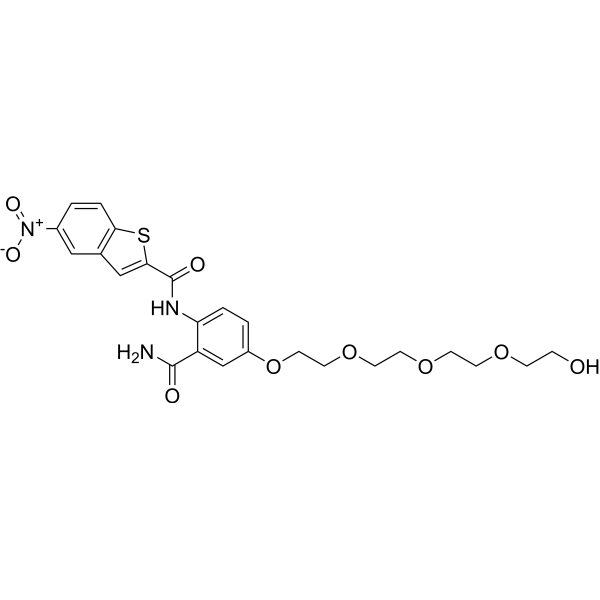
-
- HY-153539
-
|
|
Others
|
Others
|
|
AP-C3 is a potent inhibitor of guanosine 3′,5′-cyclic monophosphate (cGMP)-dependent protein kinase II (cGKII) with a pIC50 of 6.3. AP-C3 only weakly inhibits cGKII-dependent anion secretion .
|
-
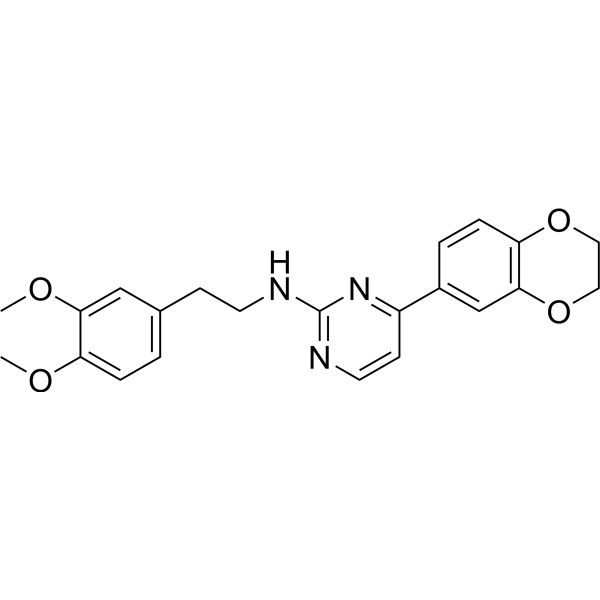
-
- HY-157510
-
|
|
E3 Ligase Ligand-Linker Conjugates
|
Cancer
|
|
Thalidomide-O-C3-azide is a click chemistry modification of the cereblon (CRBN) inhibitor Thalidomide (HY-14658). Thalidomide-O-C3-azide contains an azide group and can undergo copper-catalyzed azide-alkyne cycloaddition reaction (CuAAc) with molecules containing alkyne groups. Thalidomide-O-C3-azide can be used as a ligand of E3 ubiquitin ligase and Linker conjugates (E3 Ligase Ligand-Linker Conjugates) for the synthesis of PROTACs .
|
-
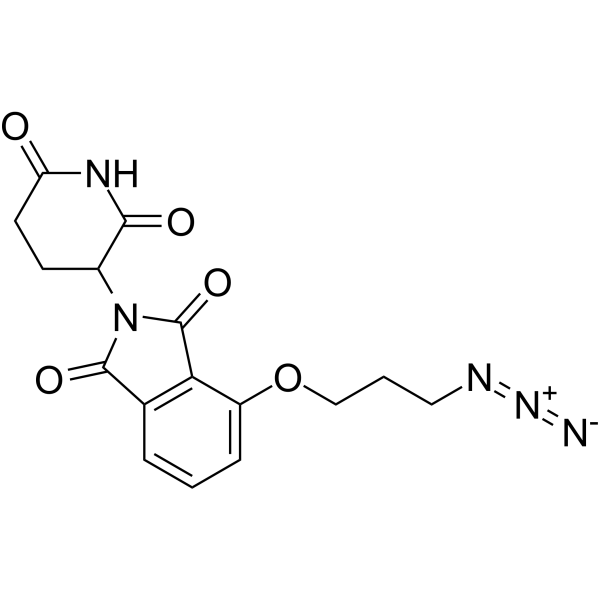
-
- HY-132295
-
|
ZN-C3
|
Wee1
|
Cancer
|
|
Azenosertib (ZN-c3) is a selective, orally active inhibitor for Wee1 inhibitor (IC50=3.9 nM). Azenosertib exhibits antitumor activity .
|
-
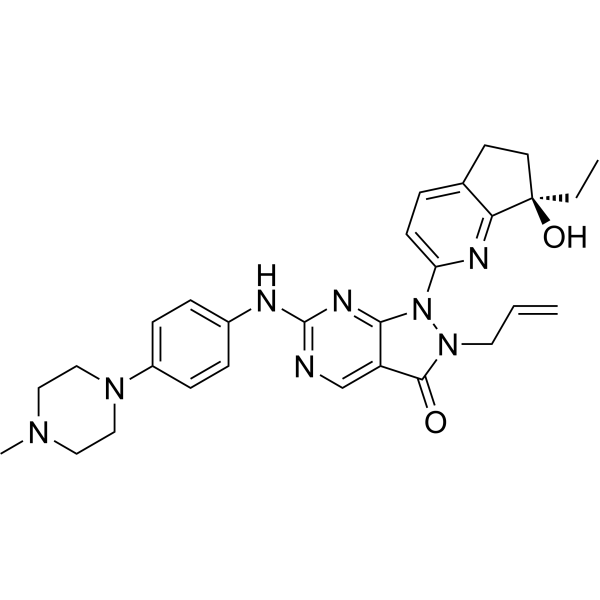
-
- HY-150648
-
|
|
Others
|
Cancer
|
|
S07-2008 is a selective aldo-keto reductase family 1 member C3 (AKR1C3) inhibitor with an IC50 of 0.16 μM. S07-2008 shows anticancer activities .
|
-
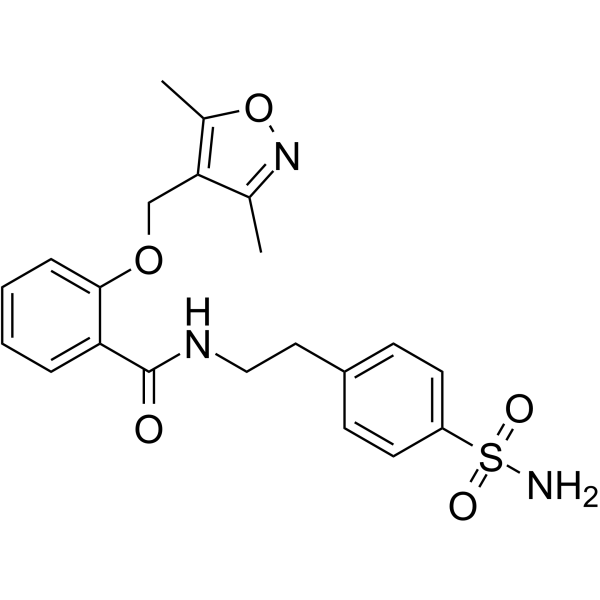
-
- HY-141893
-
|
|
DNA/RNA Synthesis
|
Infection
|
|
3-Cyanovinylcarbazole phosphoramidite is an antiviral agent that inhibits the synthesis of viral DNA. The modified nucleoside in the compound is synthesized by modifying the ribonucleotide with cyano group at the C-3 position, and can be used as a phosphoric acid amide for DNA synthesis .
|
-
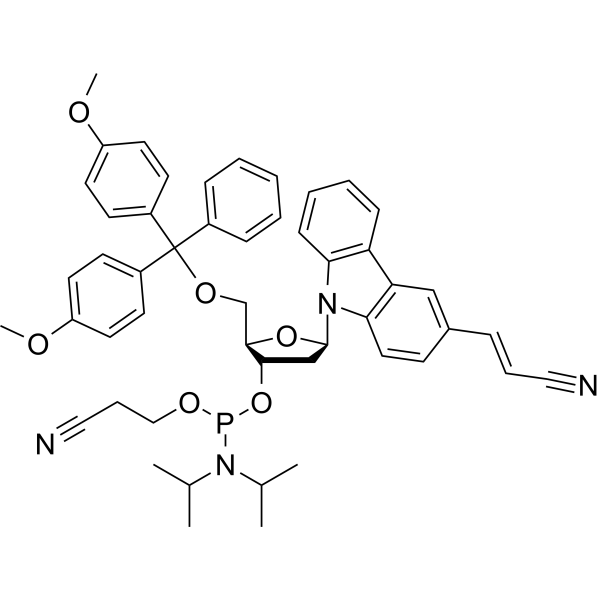
-
- HY-145255
-
|
|
PROTAC Linkers
Toll-like Receptor (TLR)
|
Inflammation/Immunology
|
|
Tri(TLR4-IN-C34-C2-amide-C3-amide-PEG1)-amide-C3-COOH is a linker that incorporates TLR4 inhibitor TLR4-IN-C34. TLR4-IN-C34 inhibits TLR4 in enterocytes and macrophages, and reduces systemic inflammation in mouse models of endotoxemia and necrotizing enterocolitis .
|
-
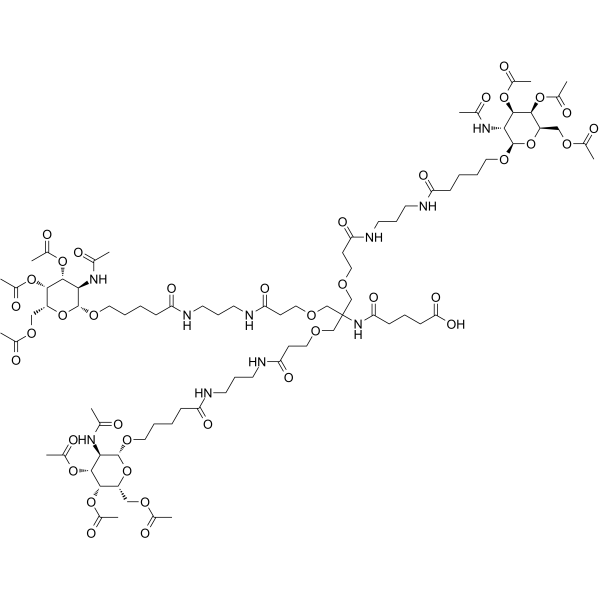
-
- HY-P3204
-
|
AL-78898A
|
Complement System
|
Metabolic Disease
|
|
POT-4 (AL-78898A), a Compstatin derivative, is a potent inhibitor of complement factor C3 activation. POT-4 can be used for age-related macular degeneration research
|
-
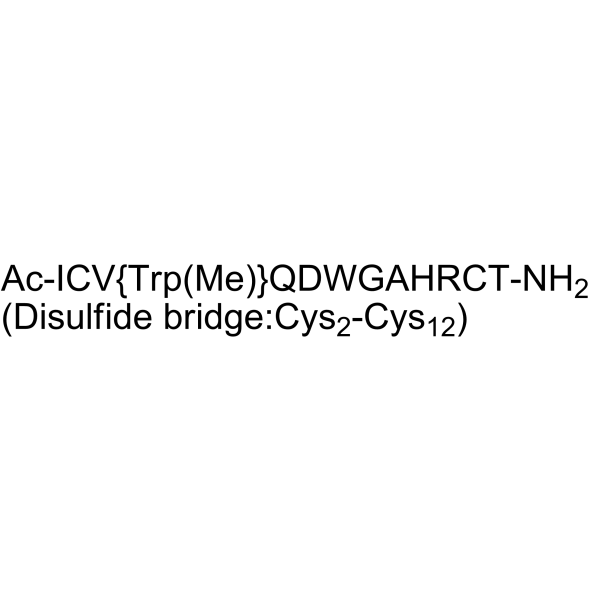
-
- HY-153540
-
|
|
Others
|
Others
|
|
AP-C4 is an inhibitor of guanosine 3′,5′-cyclic monophosphate (cGMP)-dependent protein kinase II (cGKII) with a pIC50 of 5.2. AP-C3 does not inhibit cGKII-dependent anion secretion .
|
-
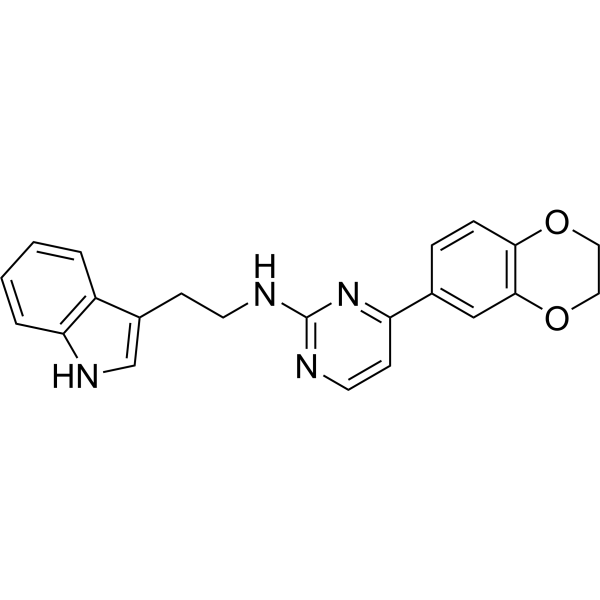
-
- HY-P3204A
-
|
AL-78898A TFA
|
Complement System
|
Metabolic Disease
|
|
POT-4 TFA (AL-78898A TFA), a Compstatin derivative, is a potent inhibitor of complement factor C3 activation. POT-4 TFA can be used for age-related macular degeneration research .
|
-
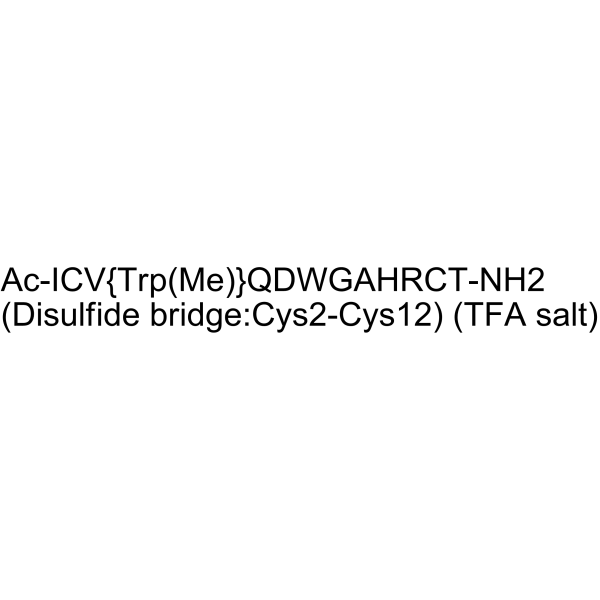
-
- HY-150624
-
|
|
SARS-CoV
|
Infection
|
|
SARS-CoV-2 nsp13-IN-3 (Compound C3) is a SARS-CoV-2 non-structural protein 13 (nsp13) small-molecule inhibitor with an IC50 of 32 μM against nsp13 ssDNA + ATPase .
|
-
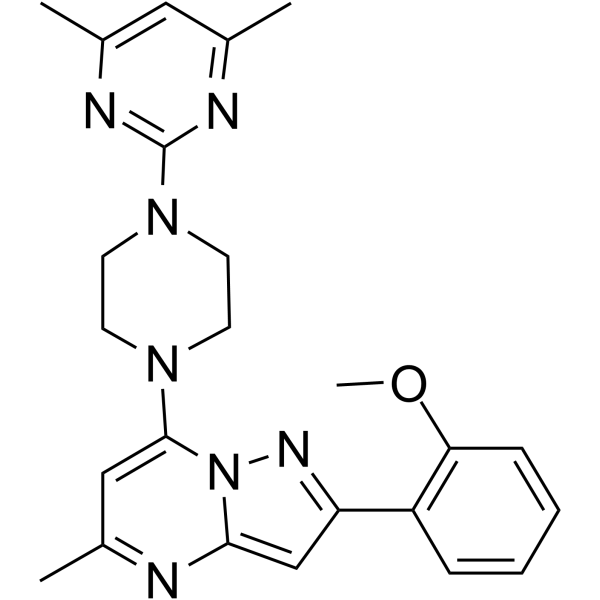
-
- HY-P99050
-
-

-
- HY-P1717
-
|
Cp40
|
Complement System
SARS-CoV
|
Inflammation/Immunology
|
|
AMY-101 (Cp40), a peptidic inhibitor of the central complement component C3 (KD = 0.5 nM), inhibits naturally occurring periodontitis in non-human primates (NHPs). AMY-101 (Cp40) exhibits a favorable anti-inflammatory activity in models with COVID-19 severe pneumonia with systemic hyper inflammation .
|
-
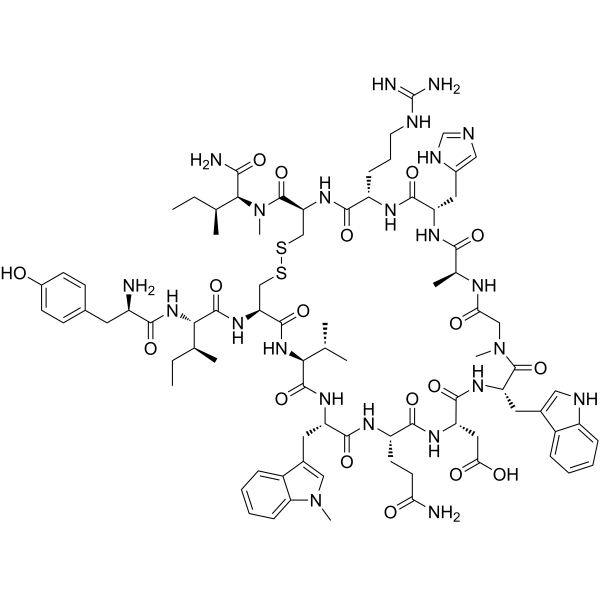
-
- HY-P1717B
-
|
Cp40 acetate
|
Complement System
SARS-CoV
|
Inflammation/Immunology
|
|
AMY-101 acetate (Cp40 acetate), a peptidic inhibitor of the central complement component C3 (KD = 0.5 nM), inhibits naturally occurring periodontitis in non-human primates (NHPs). AMY-101 acetate (Cp40 acetate) exhibits a favorable anti-inflammatory activity in models with COVID-19 severe pneumonia with systemic hyper inflammation .
|
-
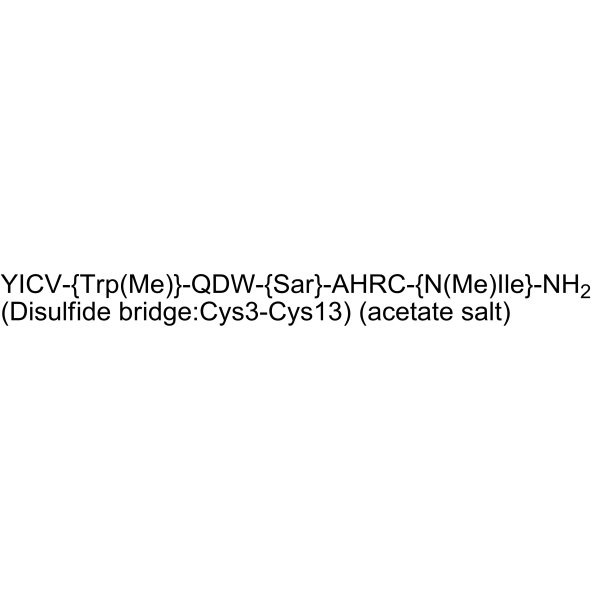
-
- HY-P1717A
-
|
Cp40 TFA
|
Complement System
SARS-CoV
|
Inflammation/Immunology
|
|
AMY-101 TFA (Cp40 TFA), a peptidic inhibitor of the central complement component C3 (KD = 0.5 nM), inhibits naturally occurring periodontitis in non-human primates (NHPs). AMY-101 (Cp40) exhibits a favorable anti-inflammatory activity in models with COVID-19 severe pneumonia with systemic hyper inflammation .
|
-
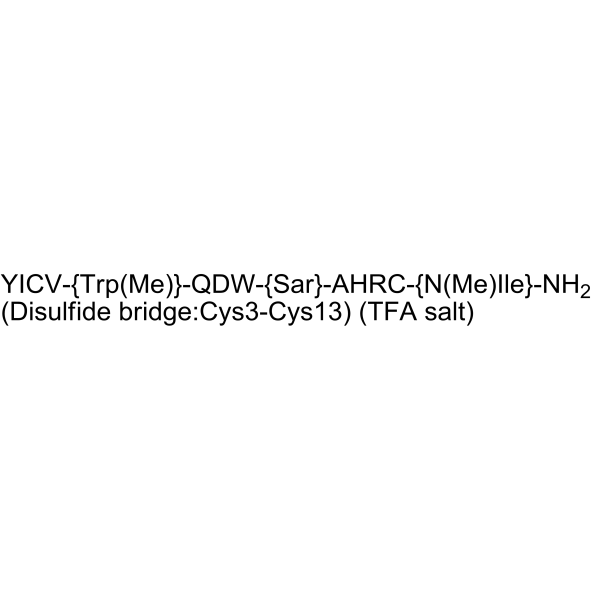
-
- HY-115902
-
|
|
FGFR
Apoptosis
|
Cancer
|
|
FGFR4-IN-7 (Compound C3) is a covalent reversible FGFR4 inhibitor with an IC50 value of 0.42 μM. FGFR4-IN-7 induces apoptosis via the FGFR4 signaling pathway blockage. FGFR4-IN-7 can be used for the research of hepatocellular carcinoma (HCC) .
|
-
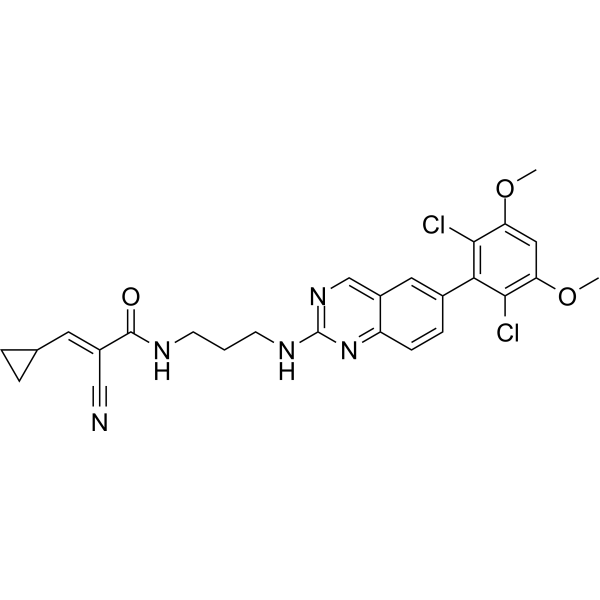
-
- HY-125877
-
|
|
PROTACs
Bcl-2 Family
|
Cancer
|
|
PROTAC Mcl1 degrader-1 (compound C3), a proteolysis targeting chimera (PROTAC) based on Cereblon ligand, is a potently and selectively Mcl-1 (Bcl-2 family member) inhibitor with an IC50 of 0.78 μM. PROTAC Mcl1 degrader-1 inhibits Bcl-2 with an IC50 of 0.54 μM .
|
-
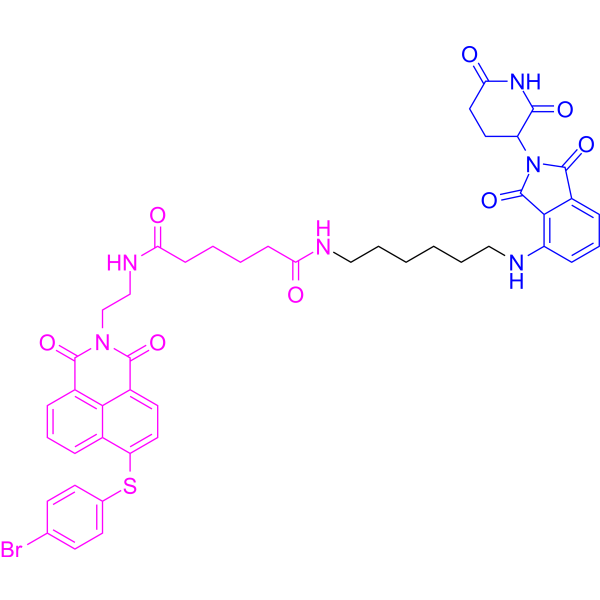
-
- HY-163267
-
|
|
Others
|
Others
|
|
ZNL0325 is a covalent probe based on pyrazolopyrimidine. ZNL0325 features an acrylamide side chain at the C3 position, which is capable of forming covalent bonds with multiple kinases that possess a cysteine at the αD-1 position, including BTK, EGFR, BLK, and JAK3. ZNL0325 can be used in the research of creating structurally distinct covalent kinase inhibitors .
|
-
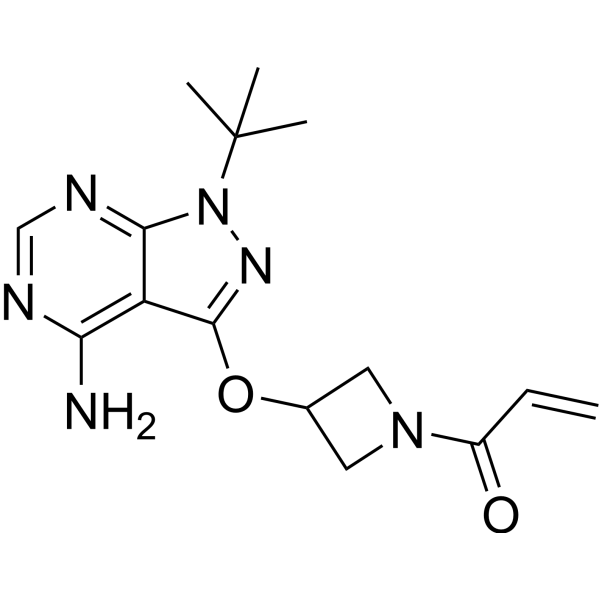
-
- HY-P990091
-
|
SAR 445088
|
Complement System
|
Inflammation/Immunology
|
|
Riliprubart (SAR445088) is an anti-C1s humanized monoclonal antibody that inhibits activated C1s in the proximal portion of the classical complement system. Riliprubart selectively inhibits activated C1s and prevents the enzymatic action of C1 on its substrates C4 and C2, thus inhibiting the formation of the classical pathway C3 convertase, C4b2a .
|
-

-
- HY-145253
-
|
|
PROTAC Linkers
Toll-like Receptor (TLR)
|
Inflammation/Immunology
|
|
Tri(TLR4-IN-C34-C2-amide-PEG1)-amide-C3-COOH is a linker that incorporates TLR4 inhibitor TLR4-IN-C34. TLR4-IN-C34 inhibits TLR4 in enterocytes and macrophages, and reduces systemic inflammation in mouse models of endotoxemia and necrotizing enterocolitis .
|
-
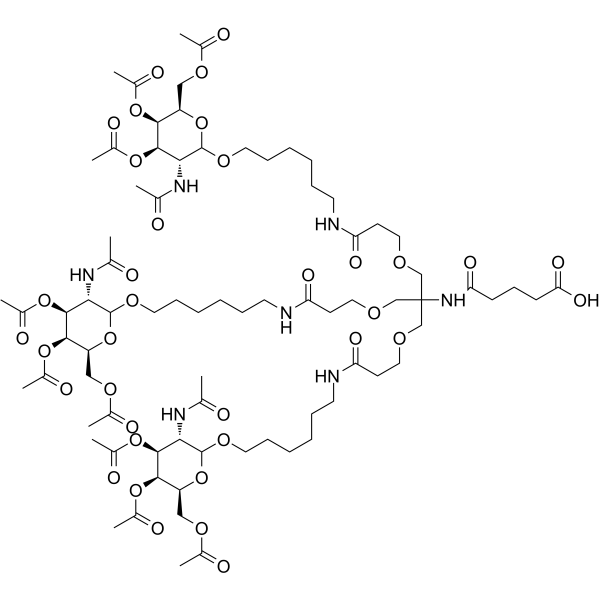
-
- HY-145254
-
|
|
Toll-like Receptor (TLR)
|
Inflammation/Immunology
|
|
Tri(TLR4-IN-C34-PEG2-amide-PEG1)-amide-C3-COOH is a linker that incorporates TLR4 inhibitor TLR4-IN-C34. TLR4-IN-C34 inhibits TLR4 in enterocytes and macrophages, and reduces systemic inflammation in mouse models of endotoxemia and necrotizing enterocolitis .
|
-
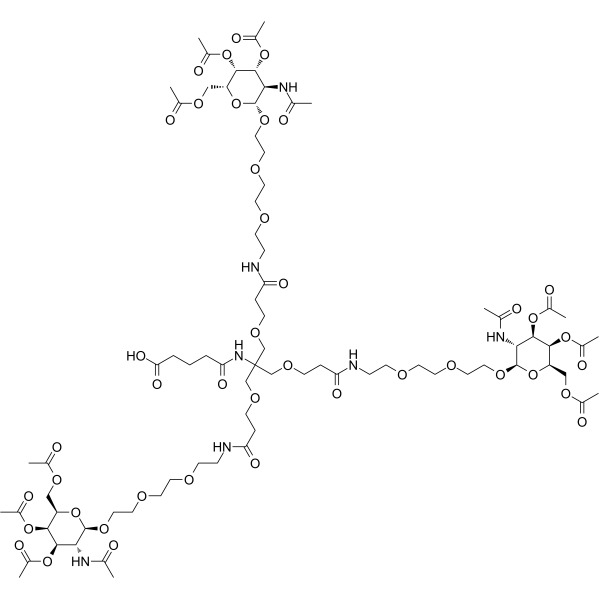
-
- HY-163032
-
|
|
FABP
|
Cardiovascular Disease
Metabolic Disease
Inflammation/Immunology
|
|
FABP4-IN-3 (compound C3) is a highly selective FABP4 inhibitor (FABP4 Ki = 25 ± 3 a nM, FABP3 Ki = 15.03 μM) which exhibits a 601-fold selectivity over FABP3. FABP4-IN-3 also shows metabolic stability and potent cellular anti-inflammatory activity, making it promising to get involved in the research of metabolic disease, cardiac dysfunction and inflammation-related disease .
|
-
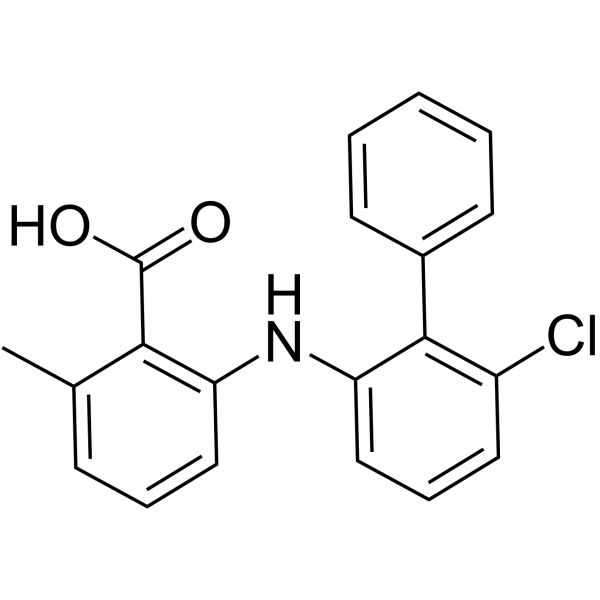
-
- HY-P2141A
-
|
|
Angiotensin Receptor
Arrestin
|
Cardiovascular Disease
|
|
TRV120027 TFA, a β-arrestin-1-biased agonist of the angiotensin II receptor type 1 (AT1R), engages ß-arrestins while blocking G-protein signaling . TRV120027 TFA induces acute catecholamine secretion through cation channel subfamily C3 (TRPC3) coupling, promotes the formation of a macromolecular complex composed of AT1R–β-arrestin-1–TRPC3–PLCγ at the plasma membrane. TRV120027 TFA inhibits angiotensin II–mediated vasoconstriction and increases cardiomyocyte contractility. TRV120027 TFA has the potential for the acute decompensated heart failure (ADHF) treatment .
|
-
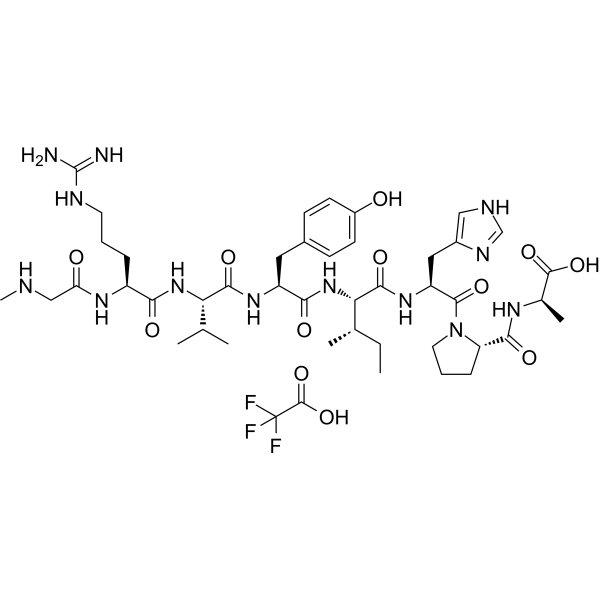
-
- HY-P2141
-
|
|
Angiotensin Receptor
Arrestin
|
Cardiovascular Disease
|
|
TRV120027, a β-arrestin-1-biased agonist of the angiotensin II receptor type 1 (AT1R), engages ß-arrestins while blocking G-protein signaling . TRV120027 induces acute catecholamine secretion through cation channel subfamily C3 (TRPC3) coupling, promotes the formation of a macromolecular complex composed of AT1R–β-arrestin-1–TRPC3–PLCγ at the plasma membrane. TRV120027 inhibits angiotensin II–mediated vasoconstriction and increases cardiomyocyte contractility. TRV120027 has the potential for the acute decompensated heart failure (ADHF) treatment .
|
-
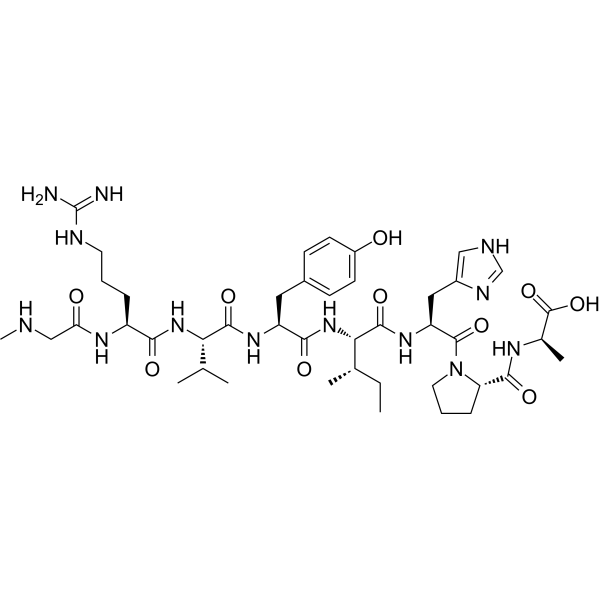
-
- HY-157810
-
|
|
Aldose Reductase
|
Cancer
|
|
AKR1C3-IN-11 (Compound 6e) is a Aldo-keto reductase 1C3 (AKR1C3) inhibitor with an IC50 of 2.0 μM. AKR1C3-IN-11 inhibit cell proliferation in combination with abiraterone (HY-70013). AKR1C3-IN-11 can be used for the research of prostate cancer .
|
-
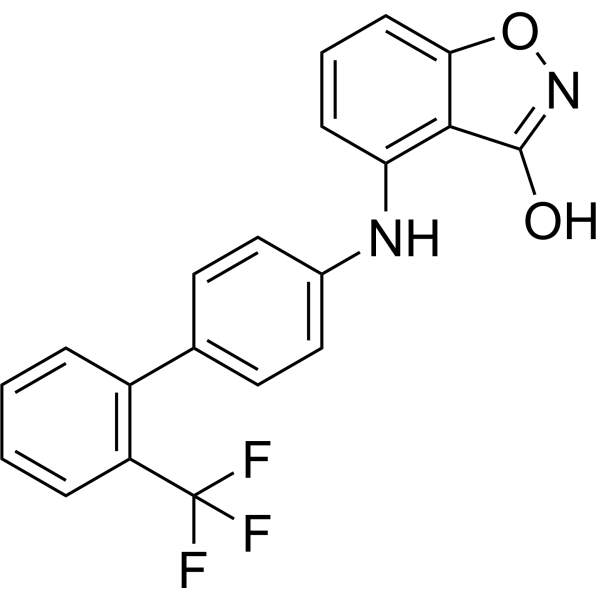
-
- HY-107379
-
|
|
Others
|
Others
|
|
AKR1C3-IN-1 is a potent, highly selective inhibitor of AKR1C3, with an IC50 of 13 nM.
|
-
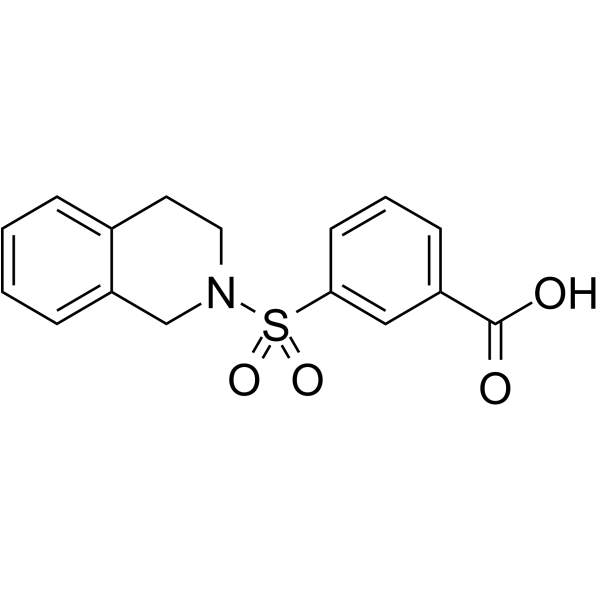
-
- HY-163323
-
|
|
Aldose Reductase
|
Cancer
|
|
AKR1C3-IN-12 (compound 2j) is an aldo-keto reductase 1C3 (AKR1C3) inhibitor with an IC50 of 27 nM. AKR1C3-IN-12 enhances the efficacy of Gemcitabine and Cisplatin in bladder cancer .
|
-
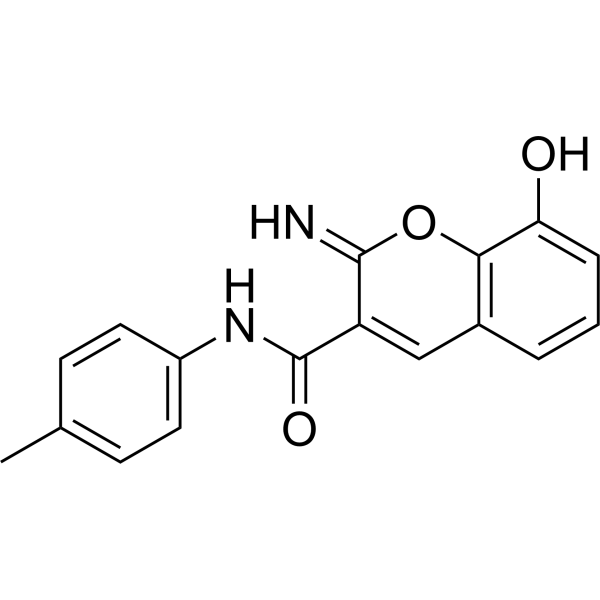
-
- HY-146574
-
|
|
Others
|
Cancer
|
|
AKR1C3-IN-7 (Compound 13) is a potent, selective AKR1C3 inhibitor with an IC50 of 0.19 μM. AKR1C3-IN-7 shows antitumor activity .
|
-
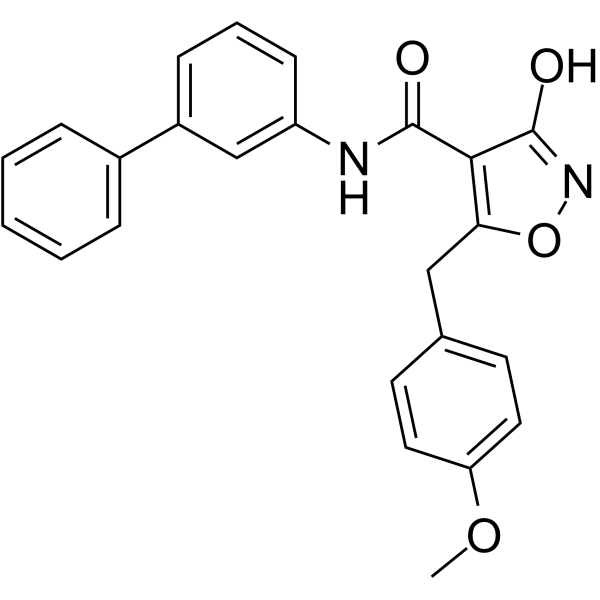
-
- HY-146575
-
|
|
Others
|
Cancer
|
|
AKR1C3-IN-8 (Compound 5) is a potent, selective AKR1C3 inhibitor with an IC50 of 0.069 μM. AKR1C3-IN-8 shows antitumor activity .
|
-
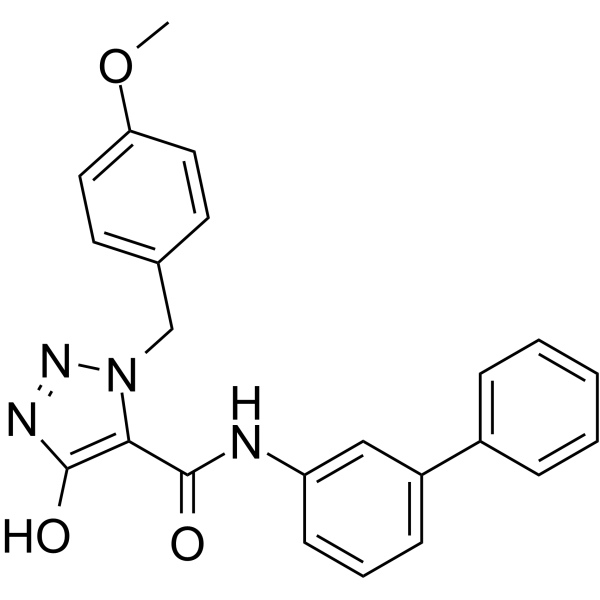
-
- HY-138557
-
|
|
17β-HSD
|
Cancer
|
|
AKR1C3-IN-4 is a potent and selective aldo-keto reductase 1C3 (AKR1C3) inhibitor with an IC50 of 0.56 μM. AKR1C3-IN-4 has the potential for castrate resistant prostate cancer (CRPC) research .
|
-
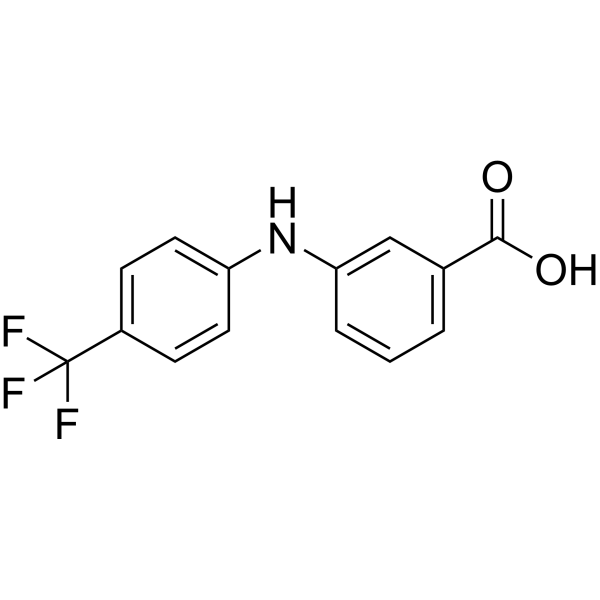
-
- HY-155502
-
|
|
Aldose Reductase
|
Cancer
|
|
AKR1C3-IN-10 (compound 5r) is a selective AKR1C3 inhibitor (IC50=51 nM). AKR1C3-IN-10 shows good activity in a prostate cancer xenograft model .
|
-
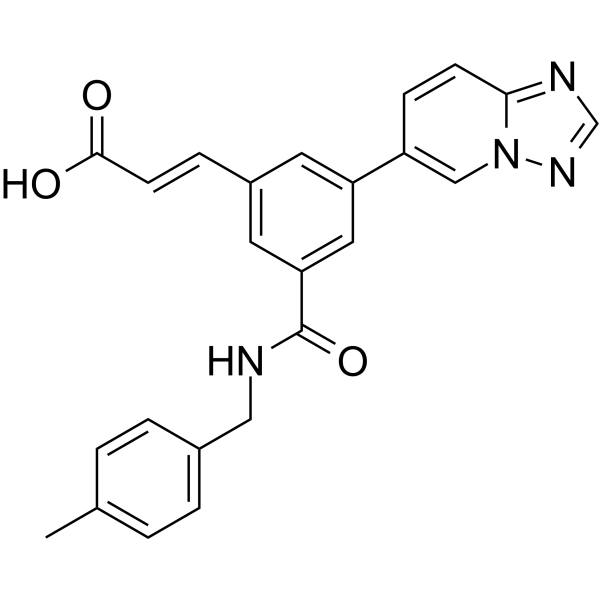
-
- HY-152188
-
-
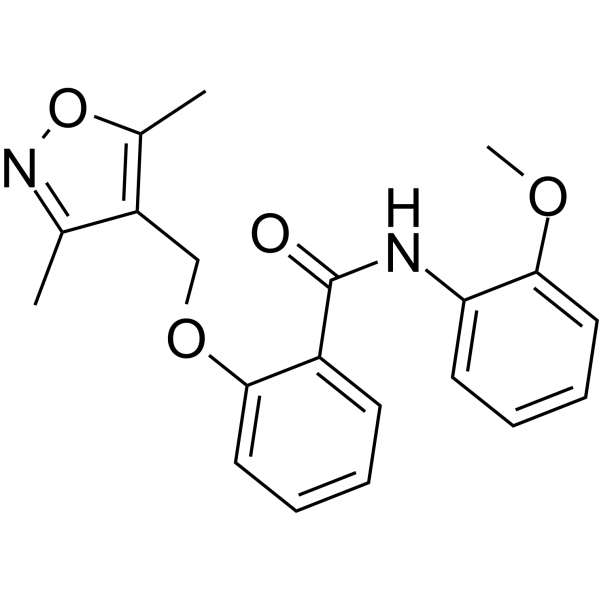
-
- HY-162266
-
|
|
Others
|
Metabolic Disease
|
|
C3TD879 is a potent Type I kinase inhibitor. C3TD879 inhibits CITK catalytic activity with an IC50 of 12 nM .
|
-
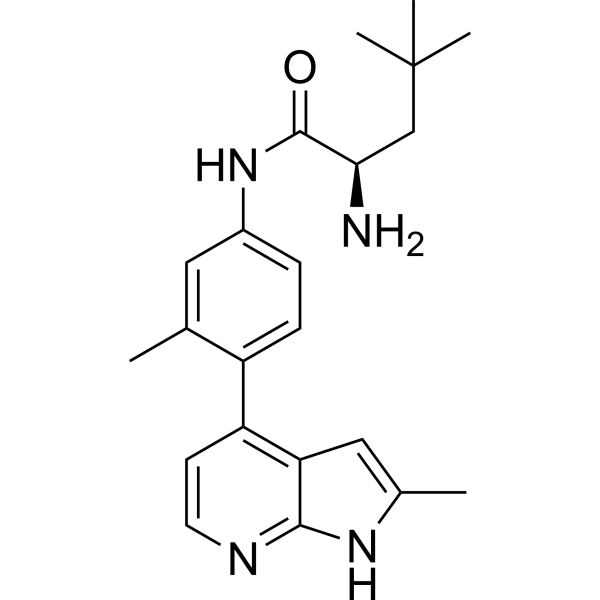
-
- HY-146573
-
|
|
Others
|
Cancer
|
|
AKR1C3-IN-6 (Compound 1) is a potent, selective AKR1C3 inhibitor with IC50 values of 0.31 μM and 73.23 μM against AKR1C3 and AKR1C2, respectively. AKR1C3-IN-6 shows antitumor activity .
|
-
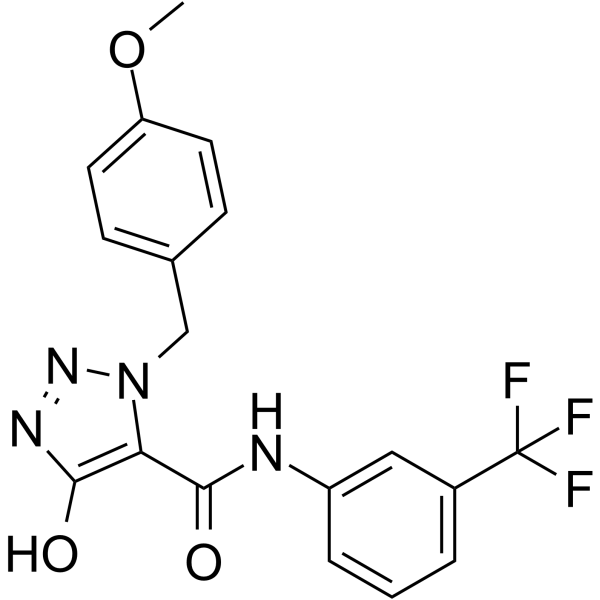
-
- HY-155035
-
|
|
Others
|
Cancer
|
|
S07-1066 is an aldo-keto reductase 1C3 (AKR1C3) inhibitor, synergizing doxorubicin (DOX) cytotoxicity. S07-1066 selectively blocks AKR1C3-mediated reduction of DOX, and reverses the DOX resistance in overexpressing AKR1C3 cells .
|
-
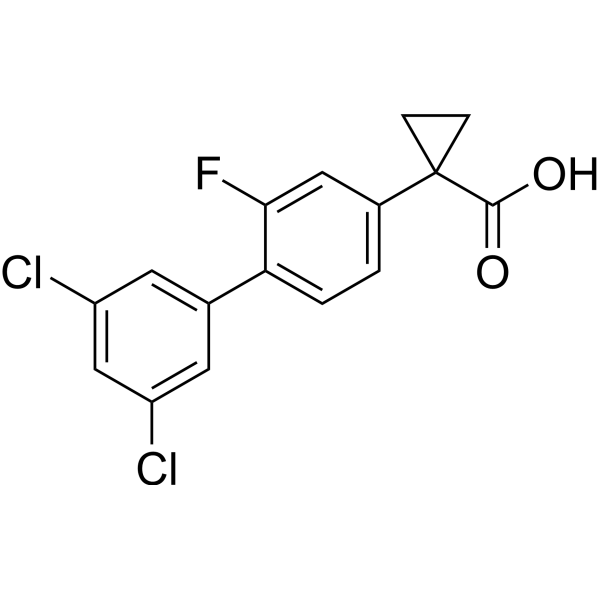
-
- HY-19903
-
|
|
Others
|
Cancer
|
|
ASP-9521 is a potent, selective and orally available AKR1C3 inhibitor with an IC50 of 11 nM for human AKR1C3.
|
-
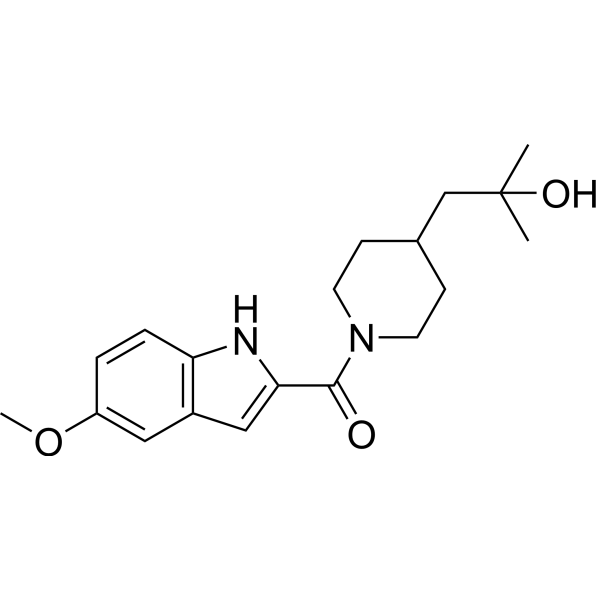
-
- HY-152189
-
|
|
Others
|
Cancer
|
|
S19-1035 is a highly potent and specific aldo-keto reductase 1C3 (AKR1C3) inhibitor. S19-1035 inhibits AKR1C3 with an IC50 value of 3.04 nM. S19-1035 can be used for the research of tumor .
|
-
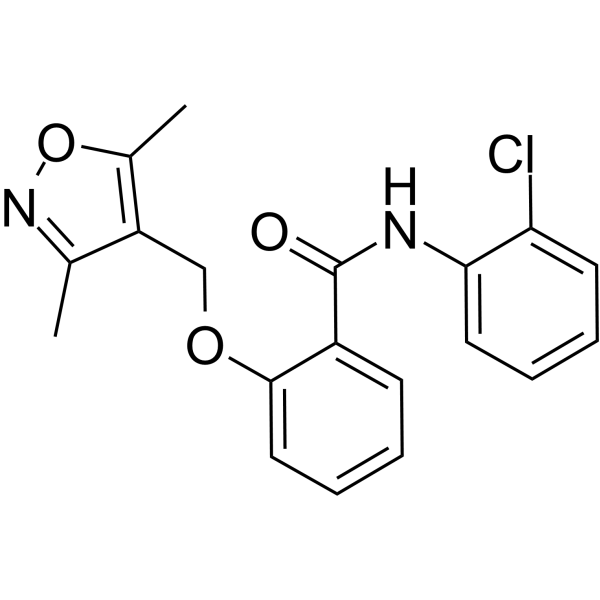
-
- HY-144749
-
|
|
Others
|
Cancer
|
|
AKR1C3-IN-5 (Compound 6e) is a potent inhibitor of AKR1C3. AKR1C3 enzyme is overexpressed in hormone-dependent prostate and breast tumors. AKR1C3-IN-5 derived from drupanin, which exhibits half-maximal inhibitory concentration (IC50) of 9.6 ± 3 μM and selectivity index (SI) of 5.5 against MCF-7 cells .
|
-
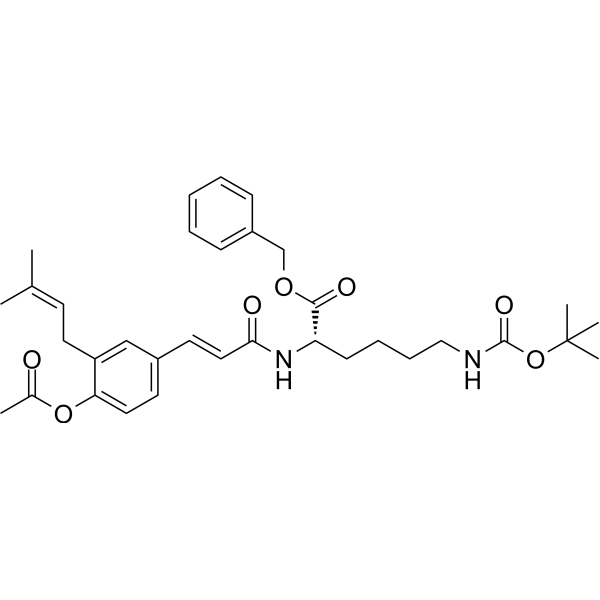
-
- HY-12481A
-
|
|
Others
|
Cancer
|
|
SAR405 R enantiomer is the less active enantiomer of SAR405. SAR405 is a PIK3C3/Vps34 inhibitor.
|
-
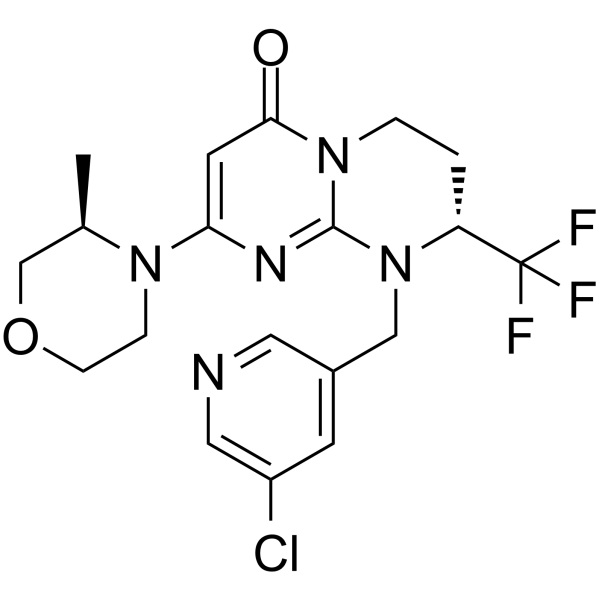
-
- HY-150646
-
|
|
Others
|
Cancer
|
|
S07-2009 is a potent and selective aldo-keto reductase 1C3 (AKR1C3) inhibitor with an IC50 value of 0.20 μM .
|
-
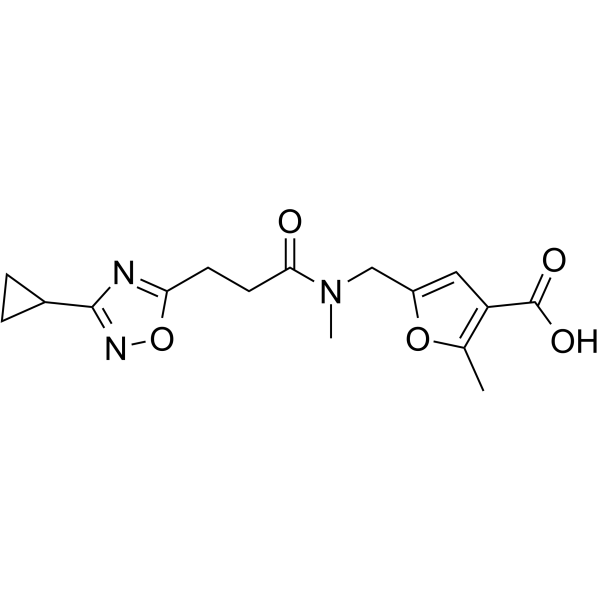
-
- HY-109154
-
|
|
Others
|
Inflammation/Immunology
|
|
Obafistat is a potent aldo-keto reductase AKR1C3 inhibitor with an IC50 of 1.2 nM for human AKR1C3 (patent WO2017202817A1, example 4) .
|
-
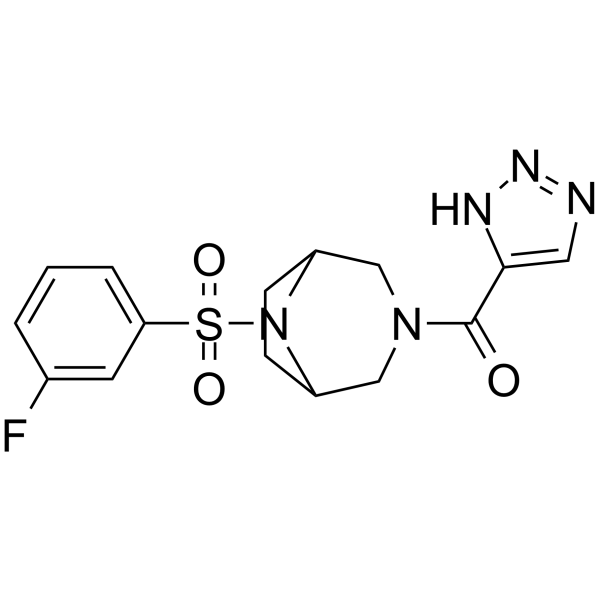
-
- HY-B0526S
-
-
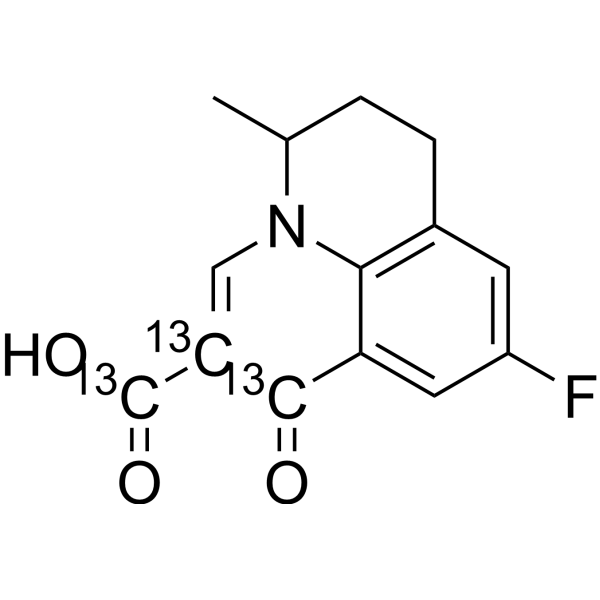
-
- HY-14605BS
-
|
AGN1135-13C3; TVP1012-13C3 racemic
|
Isotope-Labeled Compounds
Monoamine Oxidase
|
Neurological Disease
|
|
Rasagiline- 13C3 (mesylate racemic) is a 13C-labeled Rasagiline mesylate racemic. Rasagiline mesylate racemic is a highly potent selective irreversible mitochondrial monoamine oxidase (MAO) inhibitor[1]. Rasagiline-13C3 (mesylate racemic) is a click chemistry reagent, it contains an Alkyne group and can undergo copper-catalyzed azide-alkyne cycloaddition (CuAAc) with molecules containing Azide groups.
|
-
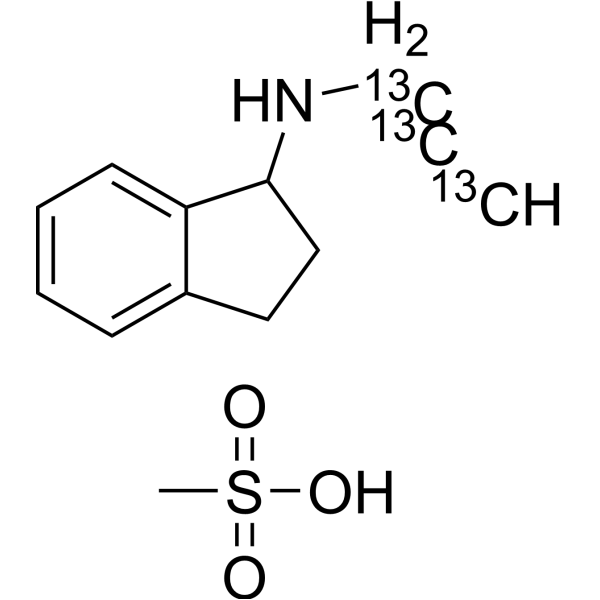
-
- HY-100683
-
|
|
Phosphatase
|
Cancer
|
|
A12B4C3 is a potent human polynucleotide kinase/phosphatase (hPNKP) inhibitor with an IC50 value of 0.06 μM. A12B4C3 has antiproliferative activity against cancer cells. A12B4C3 can also enhance the radiosensitivity of certain cancer cells .
|
-
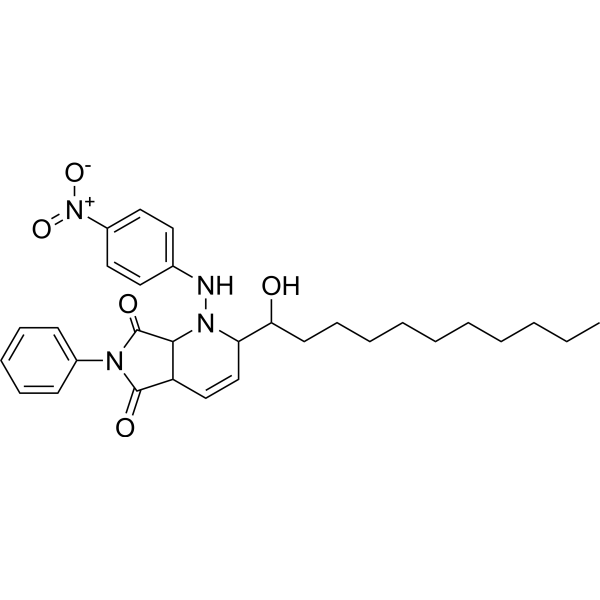
-
- HY-RI00006
-
|
|
MicroRNA
|
|
|
hsa-let-7c-3p inhibitors are chemically-modified oligonucleotides that hybridize with mature miRNAs. The miRNA inhibitors have full-length nucleotide 2'-methoxy modification. The miRNA inhibitors strongly compete with mature miRNAs to prevent the complementary pairing of miRNAs and their target genes, thereby inhibiting miRNAs from functioning.
|
-
hsa-let-7c-3p inhibitor
hsa-let-7c-3p inhibitor
-
- HY-RI00333
-
|
|
MicroRNA
|
|
|
hsa-miR-181c-3p inhibitors are chemically-modified oligonucleotides that hybridize with mature miRNAs. The miRNA inhibitors have full-length nucleotide 2'-methoxy modification. The miRNA inhibitors strongly compete with mature miRNAs to prevent the complementary pairing of miRNAs and their target genes, thereby inhibiting miRNAs from functioning.
|
-
hsa-miR-181c-3p inhibitor
hsa-miR-181c-3p inhibitor
-
- HY-RI00407
-
|
|
MicroRNA
|
|
|
hsa-miR-200c-3p inhibitors are chemically-modified oligonucleotides that hybridize with mature miRNAs. The miRNA inhibitors have full-length nucleotide 2'-methoxy modification. The miRNA inhibitors strongly compete with mature miRNAs to prevent the complementary pairing of miRNAs and their target genes, thereby inhibiting miRNAs from functioning.
|
-
hsa-miR-200c-3p inhibitor
hsa-miR-200c-3p inhibitor
-
- HY-RI00717
-
|
|
MicroRNA
|
|
|
hsa-miR-34c-3p inhibitors are chemically-modified oligonucleotides that hybridize with mature miRNAs. The miRNA inhibitors have full-length nucleotide 2'-methoxy modification. The miRNA inhibitors strongly compete with mature miRNAs to prevent the complementary pairing of miRNAs and their target genes, thereby inhibiting miRNAs from functioning.
|
-
hsa-miR-34c-3p inhibitor
hsa-miR-34c-3p inhibitor
- HY-RI00832
-
|
|
MicroRNA
|
|
|
hsa-miR-374c-3p inhibitors are chemically-modified oligonucleotides that hybridize with mature miRNAs. The miRNA inhibitors have full-length nucleotide 2'-methoxy modification. The miRNA inhibitors strongly compete with mature miRNAs to prevent the complementary pairing of miRNAs and their target genes, thereby inhibiting miRNAs from functioning.
|
-
hsa-miR-374c-3p inhibitor
hsa-miR-374c-3p inhibitor
- HY-RI00840
-
|
|
MicroRNA
|
|
|
hsa-miR-376c-3p inhibitors are chemically-modified oligonucleotides that hybridize with mature miRNAs. The miRNA inhibitors have full-length nucleotide 2'-methoxy modification. The miRNA inhibitors strongly compete with mature miRNAs to prevent the complementary pairing of miRNAs and their target genes, thereby inhibiting miRNAs from functioning.
|
-
hsa-miR-376c-3p inhibitor
hsa-miR-376c-3p inhibitor
- HY-RI01112
-
|
|
MicroRNA
|
|
|
hsa-miR-449c-3p inhibitors are chemically-modified oligonucleotides that hybridize with mature miRNAs. The miRNA inhibitors have full-length nucleotide 2'-methoxy modification. The miRNA inhibitors strongly compete with mature miRNAs to prevent the complementary pairing of miRNAs and their target genes, thereby inhibiting miRNAs from functioning.
|
-
hsa-miR-449c-3p inhibitor
hsa-miR-449c-3p inhibitor
- HY-RI01546
-
|
|
MicroRNA
|
|
|
hsa-miR-513c-3p inhibitors are chemically-modified oligonucleotides that hybridize with mature miRNAs. The miRNA inhibitors have full-length nucleotide 2'-methoxy modification. The miRNA inhibitors strongly compete with mature miRNAs to prevent the complementary pairing of miRNAs and their target genes, thereby inhibiting miRNAs from functioning.
|
-
hsa-miR-513c-3p inhibitor
hsa-miR-513c-3p inhibitor
- HY-RI01568
-
|
|
MicroRNA
|
|
|
hsa-miR-518c-3p inhibitors are chemically-modified oligonucleotides that hybridize with mature miRNAs. The miRNA inhibitors have full-length nucleotide 2'-methoxy modification. The miRNA inhibitors strongly compete with mature miRNAs to prevent the complementary pairing of miRNAs and their target genes, thereby inhibiting miRNAs from functioning.
|
-
hsa-miR-518c-3p inhibitor
hsa-miR-518c-3p inhibitor
- HY-RI01590
-
|
|
MicroRNA
|
|
|
hsa-miR-519c-3p inhibitors are chemically-modified oligonucleotides that hybridize with mature miRNAs. The miRNA inhibitors have full-length nucleotide 2'-methoxy modification. The miRNA inhibitors strongly compete with mature miRNAs to prevent the complementary pairing of miRNAs and their target genes, thereby inhibiting miRNAs from functioning.
|
-
hsa-miR-519c-3p inhibitor
hsa-miR-519c-3p inhibitor
- HY-RI01598
-
|
|
MicroRNA
|
|
|
hsa-miR-520c-3p inhibitors are chemically-modified oligonucleotides that hybridize with mature miRNAs. The miRNA inhibitors have full-length nucleotide 2'-methoxy modification. The miRNA inhibitors strongly compete with mature miRNAs to prevent the complementary pairing of miRNAs and their target genes, thereby inhibiting miRNAs from functioning.
|
-
hsa-miR-520c-3p inhibitor
hsa-miR-520c-3p inhibitor
- HY-RI01678
-
|
|
MicroRNA
|
|
|
hsa-miR-548c-3p inhibitors are chemically-modified oligonucleotides that hybridize with mature miRNAs. The miRNA inhibitors have full-length nucleotide 2'-methoxy modification. The miRNA inhibitors strongly compete with mature miRNAs to prevent the complementary pairing of miRNAs and their target genes, thereby inhibiting miRNAs from functioning.
|
-
hsa-miR-548c-3p inhibitor
hsa-miR-548c-3p inhibitor
- HY-RI02506
-
|
|
MicroRNA
|
|
|
hsa-miR-892c-3p inhibitors are chemically-modified oligonucleotides that hybridize with mature miRNAs. The miRNA inhibitors have full-length nucleotide 2'-methoxy modification. The miRNA inhibitors strongly compete with mature miRNAs to prevent the complementary pairing of miRNAs and their target genes, thereby inhibiting miRNAs from functioning.
|
-
hsa-miR-892c-3p inhibitor
hsa-miR-892c-3p inhibitor
- HY-RI02698
-
|
|
MicroRNA
|
|
|
mmu-miR-181c-3p inhibitors are chemically-modified oligonucleotides that hybridize with mature miRNAs. The miRNA inhibitors have full-length nucleotide 2'-methoxy modification. The miRNA inhibitors strongly compete with mature miRNAs to prevent the complementary pairing of miRNAs and their target genes, thereby inhibiting miRNAs from functioning.
|
-
mmu-miR-181c-3p inhibitor
mmu-miR-181c-3p inhibitor
- HY-RI02795
-
|
|
MicroRNA
|
|
|
mmu-miR-1970c-3p inhibitors are chemically-modified oligonucleotides that hybridize with mature miRNAs. The miRNA inhibitors have full-length nucleotide 2'-methoxy modification. The miRNA inhibitors strongly compete with mature miRNAs to prevent the complementary pairing of miRNAs and their target genes, thereby inhibiting miRNAs from functioning.
|
-
mmu-miR-1970c-3p inhibitor
mmu-miR-1970c-3p inhibitor
- HY-RI02833
-
|
|
MicroRNA
|
|
|
mmu-miR-216c-3p inhibitors are chemically-modified oligonucleotides that hybridize with mature miRNAs. The miRNA inhibitors have full-length nucleotide 2'-methoxy modification. The miRNA inhibitors strongly compete with mature miRNAs to prevent the complementary pairing of miRNAs and their target genes, thereby inhibiting miRNAs from functioning.
|
-
mmu-miR-216c-3p inhibitor
mmu-miR-216c-3p inhibitor
- HY-RI02840
-
|
|
MicroRNA
|
|
|
mmu-miR-219c-3p inhibitors are chemically-modified oligonucleotides that hybridize with mature miRNAs. The miRNA inhibitors have full-length nucleotide 2'-methoxy modification. The miRNA inhibitors strongly compete with mature miRNAs to prevent the complementary pairing of miRNAs and their target genes, thereby inhibiting miRNAs from functioning.
|
-
mmu-miR-219c-3p inhibitor
mmu-miR-219c-3p inhibitor
- HY-RI02897
-
|
|
MicroRNA
|
|
|
mmu-miR-302c-3p inhibitors are chemically-modified oligonucleotides that hybridize with mature miRNAs. The miRNA inhibitors have full-length nucleotide 2'-methoxy modification. The miRNA inhibitors strongly compete with mature miRNAs to prevent the complementary pairing of miRNAs and their target genes, thereby inhibiting miRNAs from functioning.
|
-
mmu-miR-302c-3p inhibitor
mmu-miR-302c-3p inhibitor
- HY-RI03043
-
|
|
MicroRNA
|
|
|
mmu-miR-344c-3p inhibitors are chemically-modified oligonucleotides that hybridize with mature miRNAs. The miRNA inhibitors have full-length nucleotide 2'-methoxy modification. The miRNA inhibitors strongly compete with mature miRNAs to prevent the complementary pairing of miRNAs and their target genes, thereby inhibiting miRNAs from functioning.
|
-
mmu-miR-344c-3p inhibitor
mmu-miR-344c-3p inhibitor
- HY-RI03077
-
|
|
MicroRNA
|
|
|
mmu-miR-34c-3p inhibitors are chemically-modified oligonucleotides that hybridize with mature miRNAs. The miRNA inhibitors have full-length nucleotide 2'-methoxy modification. The miRNA inhibitors strongly compete with mature miRNAs to prevent the complementary pairing of miRNAs and their target genes, thereby inhibiting miRNAs from functioning.
|
-
mmu-miR-34c-3p inhibitor
mmu-miR-34c-3p inhibitor
- HY-RI03104
-
|
|
MicroRNA
|
|
|
mmu-miR-374c-3p inhibitors are chemically-modified oligonucleotides that hybridize with mature miRNAs. The miRNA inhibitors have full-length nucleotide 2'-methoxy modification. The miRNA inhibitors strongly compete with mature miRNAs to prevent the complementary pairing of miRNAs and their target genes, thereby inhibiting miRNAs from functioning.
|
-
mmu-miR-374c-3p inhibitor
mmu-miR-374c-3p inhibitor
- HY-RI03111
-
|
|
MicroRNA
|
|
|
mmu-miR-376c-3p inhibitors are chemically-modified oligonucleotides that hybridize with mature miRNAs. The miRNA inhibitors have full-length nucleotide 2'-methoxy modification. The miRNA inhibitors strongly compete with mature miRNAs to prevent the complementary pairing of miRNAs and their target genes, thereby inhibiting miRNAs from functioning.
|
-
mmu-miR-376c-3p inhibitor
mmu-miR-376c-3p inhibitor
- HY-RI03148
-
|
|
MicroRNA
|
|
|
mmu-miR-449c-3p inhibitors are chemically-modified oligonucleotides that hybridize with mature miRNAs. The miRNA inhibitors have full-length nucleotide 2'-methoxy modification. The miRNA inhibitors strongly compete with mature miRNAs to prevent the complementary pairing of miRNAs and their target genes, thereby inhibiting miRNAs from functioning.
|
-
mmu-miR-449c-3p inhibitor
mmu-miR-449c-3p inhibitor
- HY-RI03198
-
|
|
MicroRNA
|
|
|
mmu-miR-467c-3p inhibitors are chemically-modified oligonucleotides that hybridize with mature miRNAs. The miRNA inhibitors have full-length nucleotide 2'-methoxy modification. The miRNA inhibitors strongly compete with mature miRNAs to prevent the complementary pairing of miRNAs and their target genes, thereby inhibiting miRNAs from functioning.
|
-
mmu-miR-467c-3p inhibitor
mmu-miR-467c-3p inhibitor
- HY-RI03460
-
|
|
MicroRNA
|
|
|
mmu-miR-669c-3p inhibitors are chemically-modified oligonucleotides that hybridize with mature miRNAs. The miRNA inhibitors have full-length nucleotide 2'-methoxy modification. The miRNA inhibitors strongly compete with mature miRNAs to prevent the complementary pairing of miRNAs and their target genes, thereby inhibiting miRNAs from functioning.
|
-
mmu-miR-669c-3p inhibitor
mmu-miR-669c-3p inhibitor
- HY-RI04277
-
|
|
MicroRNA
|
|
|
rno-miR-196c-3p inhibitors are chemically-modified oligonucleotides that hybridize with mature miRNAs. The miRNA inhibitors have full-length nucleotide 2'-methoxy modification. The miRNA inhibitors strongly compete with mature miRNAs to prevent the complementary pairing of miRNAs and their target genes, thereby inhibiting miRNAs from functioning.
|
-
rno-miR-196c-3p inhibitor
rno-miR-196c-3p inhibitor
- HY-RI04284
-
|
|
MicroRNA
|
|
|
rno-miR-200c-3p inhibitors are chemically-modified oligonucleotides that hybridize with mature miRNAs. The miRNA inhibitors have full-length nucleotide 2'-methoxy modification. The miRNA inhibitors strongly compete with mature miRNAs to prevent the complementary pairing of miRNAs and their target genes, thereby inhibiting miRNAs from functioning.
|
-
rno-miR-200c-3p inhibitor
rno-miR-200c-3p inhibitor
- HY-RI04468
-
|
|
MicroRNA
|
|
|
rno-miR-449c-3p inhibitors are chemically-modified oligonucleotides that hybridize with mature miRNAs. The miRNA inhibitors have full-length nucleotide 2'-methoxy modification. The miRNA inhibitors strongly compete with mature miRNAs to prevent the complementary pairing of miRNAs and their target genes, thereby inhibiting miRNAs from functioning.
|
-
rno-miR-449c-3p inhibitor
rno-miR-449c-3p inhibitor
- HY-RI04484
-
|
|
MicroRNA
|
|
|
rno-miR-466c-3p inhibitors are chemically-modified oligonucleotides that hybridize with mature miRNAs. The miRNA inhibitors have full-length nucleotide 2'-methoxy modification. The miRNA inhibitors strongly compete with mature miRNAs to prevent the complementary pairing of miRNAs and their target genes, thereby inhibiting miRNAs from functioning.
|
-
rno-miR-466c-3p inhibitor
rno-miR-466c-3p inhibitor
- HY-153456
-
|
|
Hedgehog
|
Cancer
|
|
Hedgehog IN-2 (Compound 20) is an inhibitor of Hedgehog pathway with an IC50 value less than 0.003 μM in C3H10T1/2 cells .
|
-
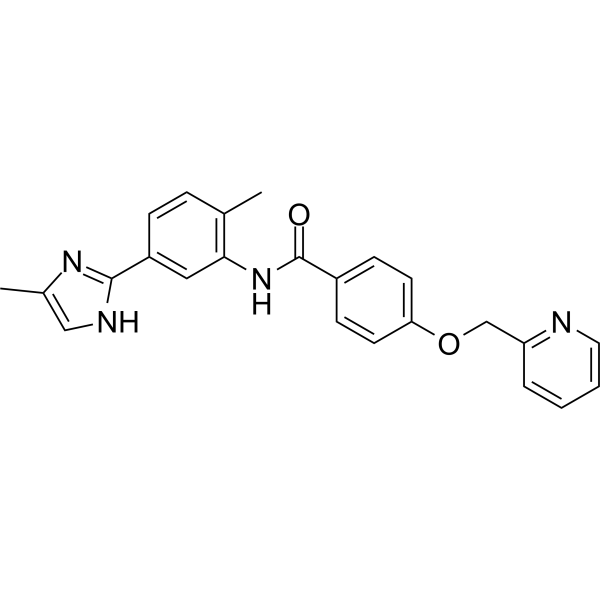
- HY-150649
-
|
|
Others
|
Cancer
|
|
S07-2005 racemic is a potent and selective aldo-keto reductase 1C3 (AKR1C3) inhibitor with an IC50 value of 0.13 μM and 0.75 μM for AKR1C3 and AKR1C4, respectively. S07-2005 racemic has potential as a chemotherapeutic potentiator for cancer agent resistance .
|
-
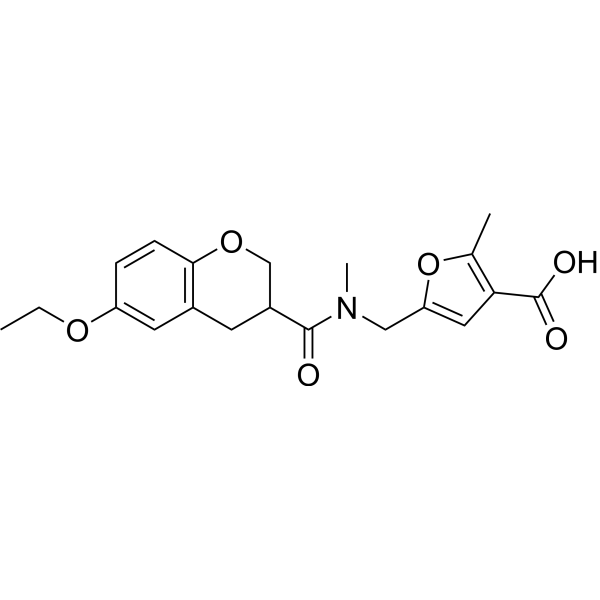
- HY-14605S
-
|
(R)-AGN1135-13C3 mesylate; TVP1012-13C3 mesylate
|
Isotope-Labeled Compounds
|
Others
|
|
Rasagiline- 13C3 ((R)-AGN1135- 13C3; TVP1012- 13C3) mesylateis the deuterium labeledRasagiline (mesylate)(HY-14605) . Rasagiline (R-AGN1135) mesylate is a highly potent selective irreversible mitochondrial monoamine oxidase (MAO) inhibitor with IC50s of 4.43?nM and 412?nM for rat brain MAO B and A activity, respectively .
|
-
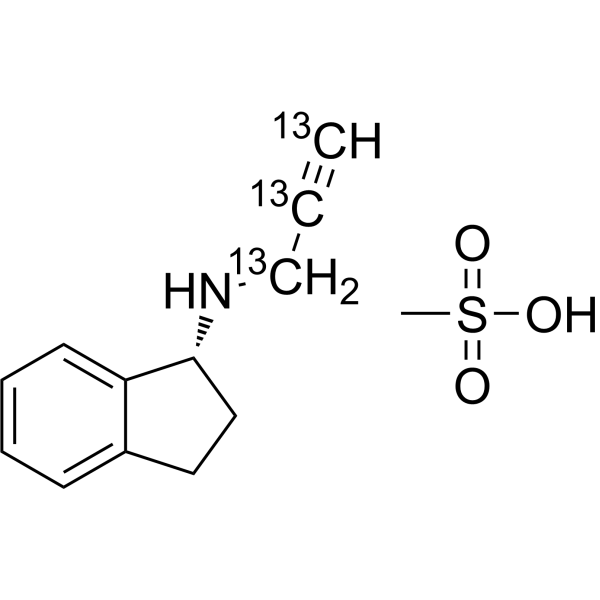
- HY-B0166S4
-
-
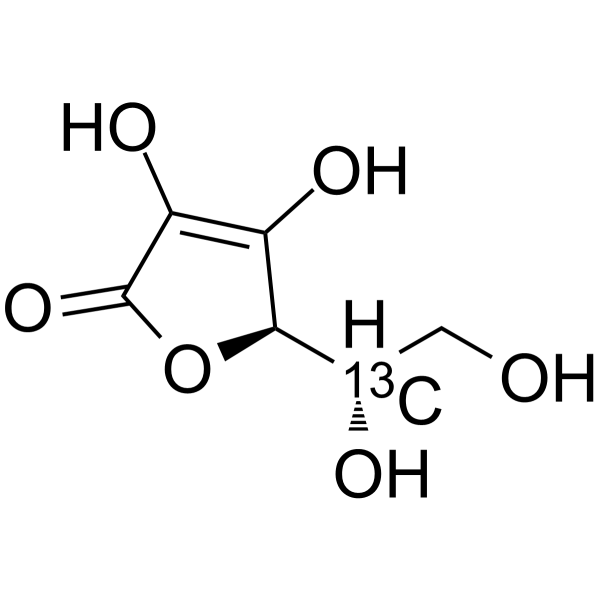
- HY-150650
-
|
|
Others
|
Cancer
|
|
S07-2001 is a potent and selective aldo-keto reductase 1C3 (AKR1C3) inhibitor with an IC50 value of 2.08 μM. S07-2001 enhances the activity of Doxorubicin against cancer cells. S07-2001 has potential as a chemotherapeutic potentiator for cancer agent resistance .
|
-
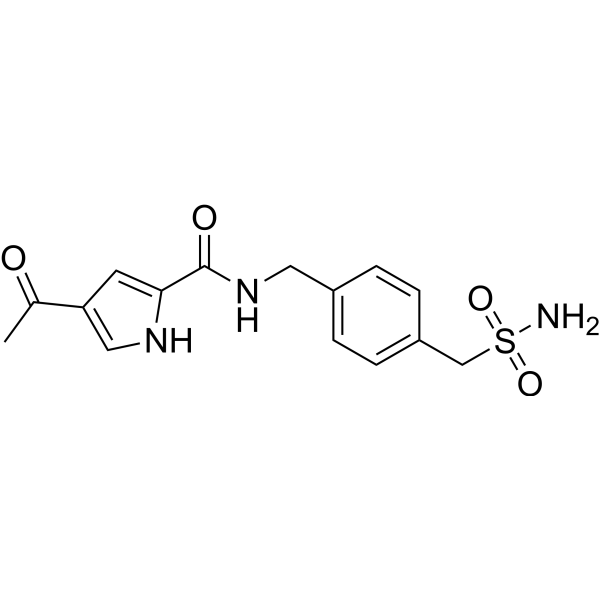
- HY-N0898S
-
-
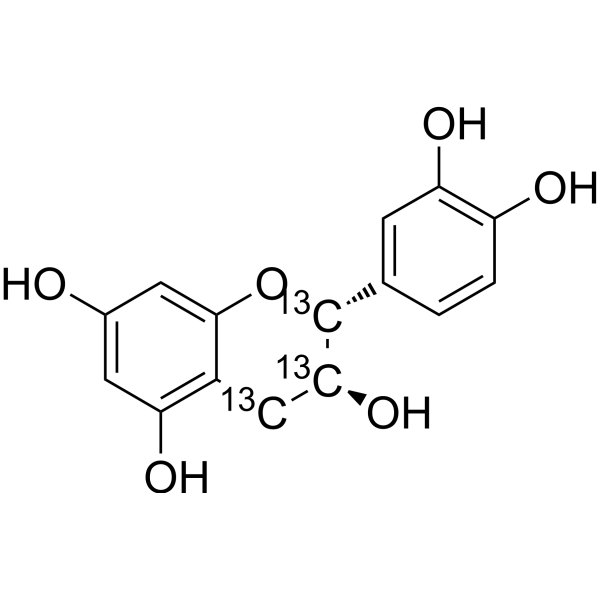
- HY-N10361
-
|
|
Others
|
Cancer
|
|
Drupanin is a compound isolated from green propolis. Drupanin can selectively inhibit the AKR1C3 enzyme. Drupanin has the potential for the research of breast cancer .
|
-
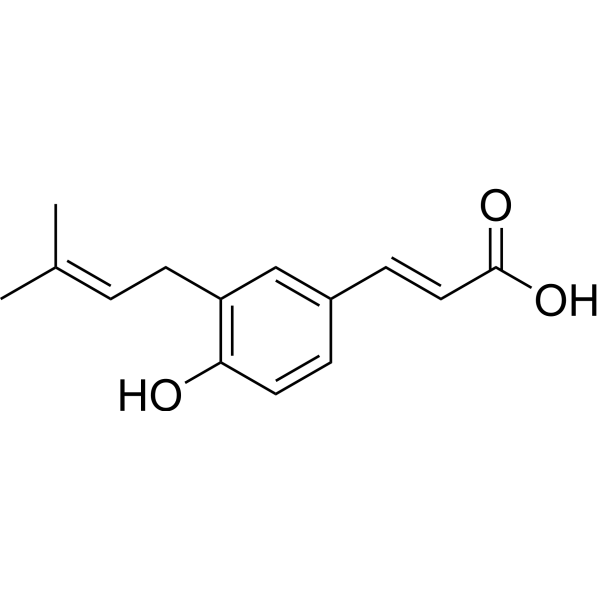
- HY-B0495S
-
|
LTG-13C3,d3; BW430C-13C3,d3
|
Sodium Channel
Autophagy
|
Neurological Disease
|
|
Lamotrigine- 13C3,d3 is the 13C-labeled Lamotrigine. Lamotrigine (BW430C) is a potent and orally active anticonvulsant or antiepileptic agent. Lamotrigine selectively blocks voltage-gated Na+ channels, stabilizing presynaptic neuronal membranes and inhibiting glutamate release. Lamotrigine can be used for the research of epilepsy, focal seizure, et al[1][2].
|
-
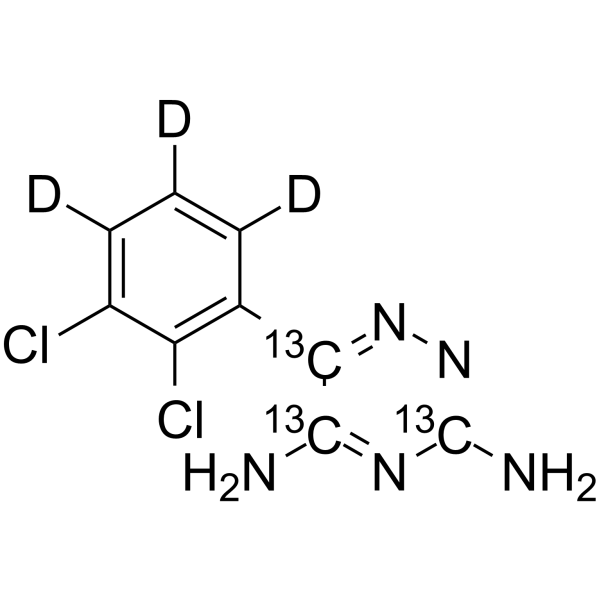
- HY-12542S
-
|
F 368-13C3
|
Isotope-Labeled Compounds
Glutathione Reductase
|
Neurological Disease
Inflammation/Immunology
|
|
Dantrolene- 13C3 is the 13C3 labeled Dantrolene. Dantrolene (F368), a muscle relaxant, non-competitively inhibits human erythrocyte glutathione reductase. Ki and IC50 values are 111.6 μM and 52.3 μM, respectively. Dantrolene is a ryanodine receptor antagonist and Ca2+ signaling stabilizer. Dantrolene can be used for the research of muscle spasticity, malignant hyperthermia, Huntington's disease and other neuroleptic malignant syndrome.
|
-
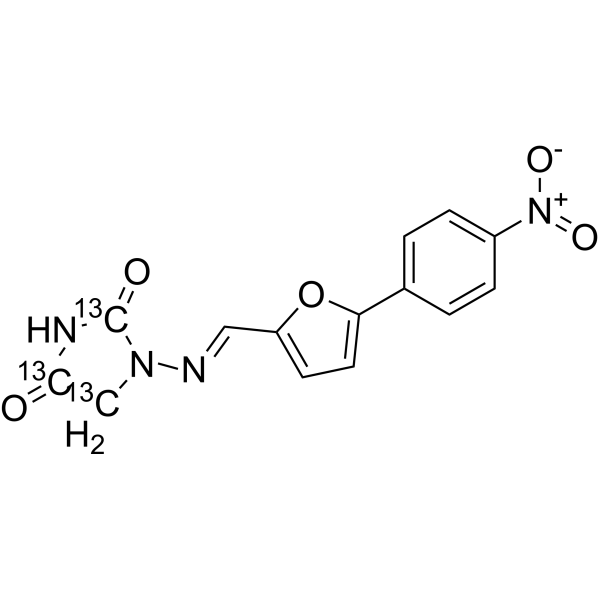
- HY-40354S
-
|
Tasocitinib-13C3; CP-690550-13C3
|
JAK
Apoptosis
|
Inflammation/Immunology
Cancer
|
|
Tofacitinib- 13C3 is the 13C-labeled Tofacitinib. Tofacitinib is an orally available JAK3/2/1 inhibitor with IC50s of 1, 20, and 112 nM, respectively.
|
-
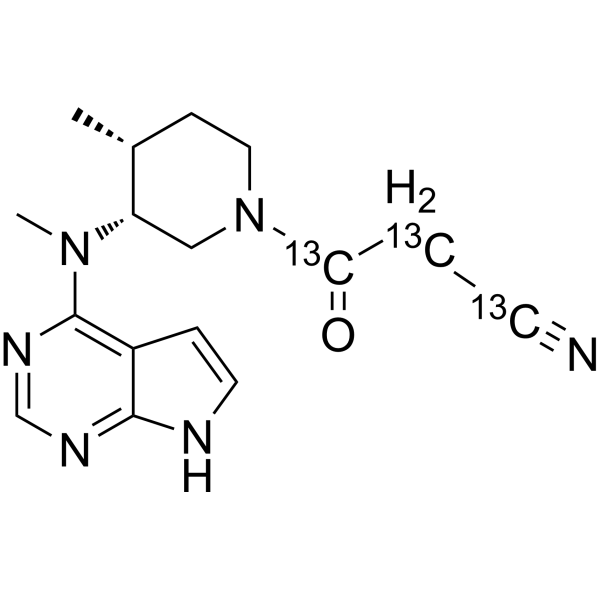
- HY-143400
-
|
|
HSP
Hedgehog
|
Cancer
|
|
HSP70-IN-3 is a potent HSP70 inhibitor (IC50s of 1.1 and 1.9 μM in ASZ001 and C3H10T1/2, respectively). HSP70-IN-3 has anti-Hh (Hedgehog signaling) activity and anti-proliferative activity and reduces expression of the oncogenic transcription factor GLI1 .
|
-
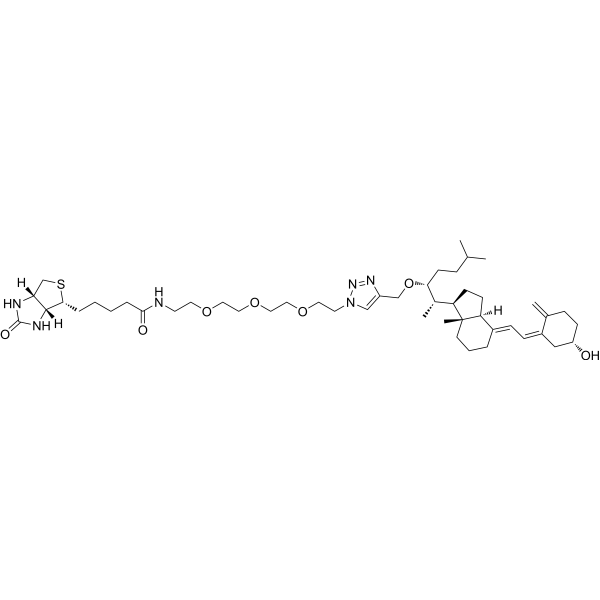
- HY-121412
-
|
|
Antibiotic
Bacterial
|
Infection
Cancer
|
|
Lankacidin C is an inhibitor of protein synthesis in vitro. Lankacidin C inhibits the activity of L1210 leukemia, B16 melanoma and 6C3 HED/OG lymphosarcoma cell lines. Lankacidin C has antibacterial activity and antitumor activity .
|
-
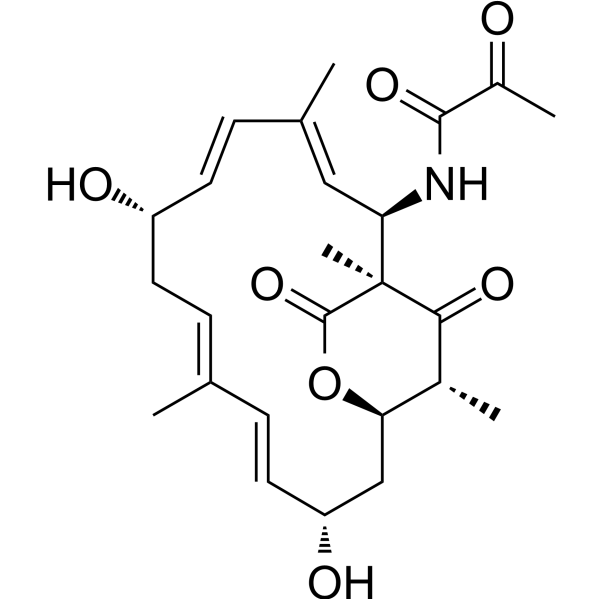
- HY-N0356S
-
|
|
Isotope-Labeled Compounds
COX
|
Cancer
|
|
(+/-)-Catechin Gallate- 13C3 is the 13C-labeled (-)-Catechin gallate. (-)-Catechin gallate is a minor constituent in green tea catechins. (-)-Catechin gallate inhibits the activity of COX-1 and COX-2 enzymes.
|
-
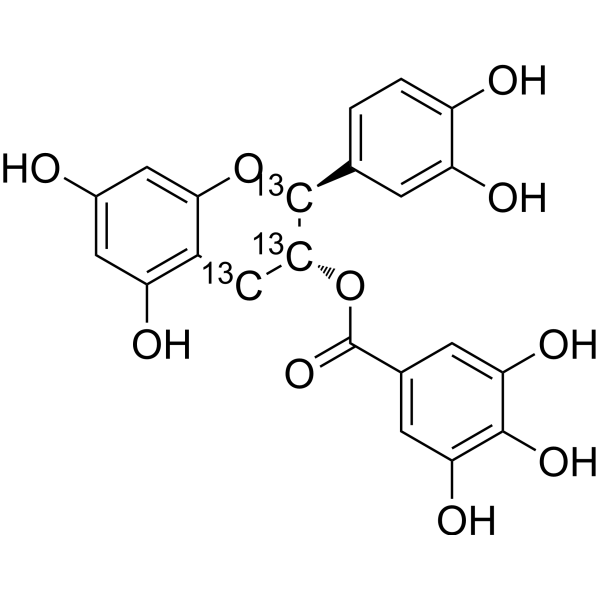
- HY-RI00006A
-
|
|
MicroRNA
|
|
|
hsa-let-7c-3p antagomirs are chemically-modified oligonucleotides that hybridize with mature miRNAs. The miRNA antagomirs have 2 phosphorothioates at the 5' end, 4 phosphorothioates at the 3' end, 1 cholesterol group at the 3' end, and full-length nucleotide 2'-methoxy modification. The miRNA antagomirs strongly compete with mature miRNAs to prevent the complementary pairing of miRNAs and their target genes, thereby inhibiting miRNAs from functioning. Stability of miRNA antagomirs appears to be significantly higher than miRNA inhibitors, they exhibits enhanced cellular uptake, stability and regulatory activity in vivo.
|
-
hsa-let-7c-3p antagomir
hsa-let-7c-3p antagomir
- HY-RI00333A
-
|
|
MicroRNA
|
|
|
hsa-miR-181c-3p antagomirs are chemically-modified oligonucleotides that hybridize with mature miRNAs. The miRNA antagomirs have 2 phosphorothioates at the 5' end, 4 phosphorothioates at the 3' end, 1 cholesterol group at the 3' end, and full-length nucleotide 2'-methoxy modification. The miRNA antagomirs strongly compete with mature miRNAs to prevent the complementary pairing of miRNAs and their target genes, thereby inhibiting miRNAs from functioning. Stability of miRNA antagomirs appears to be significantly higher than miRNA inhibitors, they exhibits enhanced cellular uptake, stability and regulatory activity in vivo.
|
-
hsa-miR-181c-3p antagomir
hsa-miR-181c-3p antagomir
- HY-RI00407A
-
|
|
MicroRNA
|
|
|
hsa-miR-200c-3p antagomirs are chemically-modified oligonucleotides that hybridize with mature miRNAs. The miRNA antagomirs have 2 phosphorothioates at the 5' end, 4 phosphorothioates at the 3' end, 1 cholesterol group at the 3' end, and full-length nucleotide 2'-methoxy modification. The miRNA antagomirs strongly compete with mature miRNAs to prevent the complementary pairing of miRNAs and their target genes, thereby inhibiting miRNAs from functioning. Stability of miRNA antagomirs appears to be significantly higher than miRNA inhibitors, they exhibits enhanced cellular uptake, stability and regulatory activity in vivo.
|
-
hsa-miR-200c-3p antagomir
hsa-miR-200c-3p antagomir
- HY-RI00717A
-
|
|
MicroRNA
|
|
|
hsa-miR-34c-3p antagomirs are chemically-modified oligonucleotides that hybridize with mature miRNAs. The miRNA antagomirs have 2 phosphorothioates at the 5' end, 4 phosphorothioates at the 3' end, 1 cholesterol group at the 3' end, and full-length nucleotide 2'-methoxy modification. The miRNA antagomirs strongly compete with mature miRNAs to prevent the complementary pairing of miRNAs and their target genes, thereby inhibiting miRNAs from functioning. Stability of miRNA antagomirs appears to be significantly higher than miRNA inhibitors, they exhibits enhanced cellular uptake, stability and regulatory activity in vivo.
|
-
hsa-miR-34c-3p antagomir
hsa-miR-34c-3p antagomir
- HY-RI00832A
-
|
|
MicroRNA
|
|
|
hsa-miR-374c-3p antagomirs are chemically-modified oligonucleotides that hybridize with mature miRNAs. The miRNA antagomirs have 2 phosphorothioates at the 5' end, 4 phosphorothioates at the 3' end, 1 cholesterol group at the 3' end, and full-length nucleotide 2'-methoxy modification. The miRNA antagomirs strongly compete with mature miRNAs to prevent the complementary pairing of miRNAs and their target genes, thereby inhibiting miRNAs from functioning. Stability of miRNA antagomirs appears to be significantly higher than miRNA inhibitors, they exhibits enhanced cellular uptake, stability and regulatory activity in vivo.
|
-
hsa-miR-374c-3p antagomir
hsa-miR-374c-3p antagomir
- HY-RI00840A
-
|
|
MicroRNA
|
|
|
hsa-miR-376c-3p antagomirs are chemically-modified oligonucleotides that hybridize with mature miRNAs. The miRNA antagomirs have 2 phosphorothioates at the 5' end, 4 phosphorothioates at the 3' end, 1 cholesterol group at the 3' end, and full-length nucleotide 2'-methoxy modification. The miRNA antagomirs strongly compete with mature miRNAs to prevent the complementary pairing of miRNAs and their target genes, thereby inhibiting miRNAs from functioning. Stability of miRNA antagomirs appears to be significantly higher than miRNA inhibitors, they exhibits enhanced cellular uptake, stability and regulatory activity in vivo.
|
-
hsa-miR-376c-3p antagomir
hsa-miR-376c-3p antagomir
- HY-RI01112A
-
|
|
MicroRNA
|
|
|
hsa-miR-449c-3p antagomirs are chemically-modified oligonucleotides that hybridize with mature miRNAs. The miRNA antagomirs have 2 phosphorothioates at the 5' end, 4 phosphorothioates at the 3' end, 1 cholesterol group at the 3' end, and full-length nucleotide 2'-methoxy modification. The miRNA antagomirs strongly compete with mature miRNAs to prevent the complementary pairing of miRNAs and their target genes, thereby inhibiting miRNAs from functioning. Stability of miRNA antagomirs appears to be significantly higher than miRNA inhibitors, they exhibits enhanced cellular uptake, stability and regulatory activity in vivo.
|
-
hsa-miR-449c-3p antagomir
hsa-miR-449c-3p antagomir
- HY-RI01546A
-
|
|
MicroRNA
|
|
|
hsa-miR-513c-3p antagomirs are chemically-modified oligonucleotides that hybridize with mature miRNAs. The miRNA antagomirs have 2 phosphorothioates at the 5' end, 4 phosphorothioates at the 3' end, 1 cholesterol group at the 3' end, and full-length nucleotide 2'-methoxy modification. The miRNA antagomirs strongly compete with mature miRNAs to prevent the complementary pairing of miRNAs and their target genes, thereby inhibiting miRNAs from functioning. Stability of miRNA antagomirs appears to be significantly higher than miRNA inhibitors, they exhibits enhanced cellular uptake, stability and regulatory activity in vivo.
|
-
hsa-miR-513c-3p antagomir
hsa-miR-513c-3p antagomir
- HY-RI01568A
-
|
|
MicroRNA
|
|
|
hsa-miR-518c-3p antagomirs are chemically-modified oligonucleotides that hybridize with mature miRNAs. The miRNA antagomirs have 2 phosphorothioates at the 5' end, 4 phosphorothioates at the 3' end, 1 cholesterol group at the 3' end, and full-length nucleotide 2'-methoxy modification. The miRNA antagomirs strongly compete with mature miRNAs to prevent the complementary pairing of miRNAs and their target genes, thereby inhibiting miRNAs from functioning. Stability of miRNA antagomirs appears to be significantly higher than miRNA inhibitors, they exhibits enhanced cellular uptake, stability and regulatory activity in vivo.
|
-
hsa-miR-518c-3p antagomir
hsa-miR-518c-3p antagomir
- HY-RI01590A
-
|
|
MicroRNA
|
|
|
hsa-miR-519c-3p antagomirs are chemically-modified oligonucleotides that hybridize with mature miRNAs. The miRNA antagomirs have 2 phosphorothioates at the 5' end, 4 phosphorothioates at the 3' end, 1 cholesterol group at the 3' end, and full-length nucleotide 2'-methoxy modification. The miRNA antagomirs strongly compete with mature miRNAs to prevent the complementary pairing of miRNAs and their target genes, thereby inhibiting miRNAs from functioning. Stability of miRNA antagomirs appears to be significantly higher than miRNA inhibitors, they exhibits enhanced cellular uptake, stability and regulatory activity in vivo.
|
-
hsa-miR-519c-3p antagomir
hsa-miR-519c-3p antagomir
- HY-RI01598A
-
|
|
MicroRNA
|
|
|
hsa-miR-520c-3p antagomirs are chemically-modified oligonucleotides that hybridize with mature miRNAs. The miRNA antagomirs have 2 phosphorothioates at the 5' end, 4 phosphorothioates at the 3' end, 1 cholesterol group at the 3' end, and full-length nucleotide 2'-methoxy modification. The miRNA antagomirs strongly compete with mature miRNAs to prevent the complementary pairing of miRNAs and their target genes, thereby inhibiting miRNAs from functioning. Stability of miRNA antagomirs appears to be significantly higher than miRNA inhibitors, they exhibits enhanced cellular uptake, stability and regulatory activity in vivo.
|
-
hsa-miR-520c-3p antagomir
hsa-miR-520c-3p antagomir
- HY-RI02506A
-
|
|
MicroRNA
|
|
|
hsa-miR-892c-3p antagomirs are chemically-modified oligonucleotides that hybridize with mature miRNAs. The miRNA antagomirs have 2 phosphorothioates at the 5' end, 4 phosphorothioates at the 3' end, 1 cholesterol group at the 3' end, and full-length nucleotide 2'-methoxy modification. The miRNA antagomirs strongly compete with mature miRNAs to prevent the complementary pairing of miRNAs and their target genes, thereby inhibiting miRNAs from functioning. Stability of miRNA antagomirs appears to be significantly higher than miRNA inhibitors, they exhibits enhanced cellular uptake, stability and regulatory activity in vivo.
|
-
hsa-miR-892c-3p antagomir
hsa-miR-892c-3p antagomir
- HY-RI02698A
-
|
|
MicroRNA
|
|
|
mmu-miR-181c-3p antagomirs are chemically-modified oligonucleotides that hybridize with mature miRNAs. The miRNA antagomirs have 2 phosphorothioates at the 5' end, 4 phosphorothioates at the 3' end, 1 cholesterol group at the 3' end, and full-length nucleotide 2'-methoxy modification. The miRNA antagomirs strongly compete with mature miRNAs to prevent the complementary pairing of miRNAs and their target genes, thereby inhibiting miRNAs from functioning. Stability of miRNA antagomirs appears to be significantly higher than miRNA inhibitors, they exhibits enhanced cellular uptake, stability and regulatory activity in vivo.
|
-
mmu-miR-181c-3p antagomir
mmu-miR-181c-3p antagomir
- HY-RI02795A
-
|
|
MicroRNA
|
|
|
mmu-miR-1970c-3p antagomirs are chemically-modified oligonucleotides that hybridize with mature miRNAs. The miRNA antagomirs have 2 phosphorothioates at the 5' end, 4 phosphorothioates at the 3' end, 1 cholesterol group at the 3' end, and full-length nucleotide 2'-methoxy modification. The miRNA antagomirs strongly compete with mature miRNAs to prevent the complementary pairing of miRNAs and their target genes, thereby inhibiting miRNAs from functioning. Stability of miRNA antagomirs appears to be significantly higher than miRNA inhibitors, they exhibits enhanced cellular uptake, stability and regulatory activity in vivo.
|
-
mmu-miR-1970c-3p antagomir
mmu-miR-1970c-3p antagomir
- HY-RI02833A
-
|
|
MicroRNA
|
|
|
mmu-miR-216c-3p antagomirs are chemically-modified oligonucleotides that hybridize with mature miRNAs. The miRNA antagomirs have 2 phosphorothioates at the 5' end, 4 phosphorothioates at the 3' end, 1 cholesterol group at the 3' end, and full-length nucleotide 2'-methoxy modification. The miRNA antagomirs strongly compete with mature miRNAs to prevent the complementary pairing of miRNAs and their target genes, thereby inhibiting miRNAs from functioning. Stability of miRNA antagomirs appears to be significantly higher than miRNA inhibitors, they exhibits enhanced cellular uptake, stability and regulatory activity in vivo.
|
-
mmu-miR-216c-3p antagomir
mmu-miR-216c-3p antagomir
- HY-RI02840A
-
|
|
MicroRNA
|
|
|
mmu-miR-219c-3p antagomirs are chemically-modified oligonucleotides that hybridize with mature miRNAs. The miRNA antagomirs have 2 phosphorothioates at the 5' end, 4 phosphorothioates at the 3' end, 1 cholesterol group at the 3' end, and full-length nucleotide 2'-methoxy modification. The miRNA antagomirs strongly compete with mature miRNAs to prevent the complementary pairing of miRNAs and their target genes, thereby inhibiting miRNAs from functioning. Stability of miRNA antagomirs appears to be significantly higher than miRNA inhibitors, they exhibits enhanced cellular uptake, stability and regulatory activity in vivo.
|
-
mmu-miR-219c-3p antagomir
mmu-miR-219c-3p antagomir
- HY-RI02897A
-
|
|
MicroRNA
|
|
|
mmu-miR-302c-3p antagomirs are chemically-modified oligonucleotides that hybridize with mature miRNAs. The miRNA antagomirs have 2 phosphorothioates at the 5' end, 4 phosphorothioates at the 3' end, 1 cholesterol group at the 3' end, and full-length nucleotide 2'-methoxy modification. The miRNA antagomirs strongly compete with mature miRNAs to prevent the complementary pairing of miRNAs and their target genes, thereby inhibiting miRNAs from functioning. Stability of miRNA antagomirs appears to be significantly higher than miRNA inhibitors, they exhibits enhanced cellular uptake, stability and regulatory activity in vivo.
|
-
mmu-miR-302c-3p antagomir
mmu-miR-302c-3p antagomir
- HY-RI04277A
-
|
|
MicroRNA
|
|
|
rno-miR-196c-3p antagomirs are chemically-modified oligonucleotides that hybridize with mature miRNAs. The miRNA antagomirs have 2 phosphorothioates at the 5' end, 4 phosphorothioates at the 3' end, 1 cholesterol group at the 3' end, and full-length nucleotide 2'-methoxy modification. The miRNA antagomirs strongly compete with mature miRNAs to prevent the complementary pairing of miRNAs and their target genes, thereby inhibiting miRNAs from functioning. Stability of miRNA antagomirs appears to be significantly higher than miRNA inhibitors, they exhibits enhanced cellular uptake, stability and regulatory activity in vivo.
|
-
rno-miR-196c-3p antagomir
rno-miR-196c-3p antagomir
- HY-RI04284A
-
|
|
MicroRNA
|
|
|
rno-miR-200c-3p antagomirs are chemically-modified oligonucleotides that hybridize with mature miRNAs. The miRNA antagomirs have 2 phosphorothioates at the 5' end, 4 phosphorothioates at the 3' end, 1 cholesterol group at the 3' end, and full-length nucleotide 2'-methoxy modification. The miRNA antagomirs strongly compete with mature miRNAs to prevent the complementary pairing of miRNAs and their target genes, thereby inhibiting miRNAs from functioning. Stability of miRNA antagomirs appears to be significantly higher than miRNA inhibitors, they exhibits enhanced cellular uptake, stability and regulatory activity in vivo.
|
-
rno-miR-200c-3p antagomir
rno-miR-200c-3p antagomir
- HY-RI03043A
-
|
|
MicroRNA
|
|
|
mmu-miR-344c-3p antagomirs are chemically-modified oligonucleotides that hybridize with mature miRNAs. The miRNA antagomirs have 2 phosphorothioates at the 5' end, 4 phosphorothioates at the 3' end, 1 cholesterol group at the 3' end, and full-length nucleotide 2'-methoxy modification. The miRNA antagomirs strongly compete with mature miRNAs to prevent the complementary pairing of miRNAs and their target genes, thereby inhibiting miRNAs from functioning. Stability of miRNA antagomirs appears to be significantly higher than miRNA inhibitors, they exhibits enhanced cellular uptake, stability and regulatory activity in vivo.
|
-
mmu-miR-344c-3p antagomir
mmu-miR-344c-3p antagomir
- HY-RI03077A
-
|
|
MicroRNA
|
|
|
mmu-miR-34c-3p antagomirs are chemically-modified oligonucleotides that hybridize with mature miRNAs. The miRNA antagomirs have 2 phosphorothioates at the 5' end, 4 phosphorothioates at the 3' end, 1 cholesterol group at the 3' end, and full-length nucleotide 2'-methoxy modification. The miRNA antagomirs strongly compete with mature miRNAs to prevent the complementary pairing of miRNAs and their target genes, thereby inhibiting miRNAs from functioning. Stability of miRNA antagomirs appears to be significantly higher than miRNA inhibitors, they exhibits enhanced cellular uptake, stability and regulatory activity in vivo.
|
-
mmu-miR-34c-3p antagomir
mmu-miR-34c-3p antagomir
- HY-RI03104A
-
|
|
MicroRNA
|
|
|
mmu-miR-374c-3p antagomirs are chemically-modified oligonucleotides that hybridize with mature miRNAs. The miRNA antagomirs have 2 phosphorothioates at the 5' end, 4 phosphorothioates at the 3' end, 1 cholesterol group at the 3' end, and full-length nucleotide 2'-methoxy modification. The miRNA antagomirs strongly compete with mature miRNAs to prevent the complementary pairing of miRNAs and their target genes, thereby inhibiting miRNAs from functioning. Stability of miRNA antagomirs appears to be significantly higher than miRNA inhibitors, they exhibits enhanced cellular uptake, stability and regulatory activity in vivo.
|
-
mmu-miR-374c-3p antagomir
mmu-miR-374c-3p antagomir
- HY-RI03111A
-
|
|
MicroRNA
|
|
|
mmu-miR-376c-3p antagomirs are chemically-modified oligonucleotides that hybridize with mature miRNAs. The miRNA antagomirs have 2 phosphorothioates at the 5' end, 4 phosphorothioates at the 3' end, 1 cholesterol group at the 3' end, and full-length nucleotide 2'-methoxy modification. The miRNA antagomirs strongly compete with mature miRNAs to prevent the complementary pairing of miRNAs and their target genes, thereby inhibiting miRNAs from functioning. Stability of miRNA antagomirs appears to be significantly higher than miRNA inhibitors, they exhibits enhanced cellular uptake, stability and regulatory activity in vivo.
|
-
mmu-miR-376c-3p antagomir
mmu-miR-376c-3p antagomir
- HY-RI04468A
-
|
|
MicroRNA
|
|
|
rno-miR-449c-3p antagomirs are chemically-modified oligonucleotides that hybridize with mature miRNAs. The miRNA antagomirs have 2 phosphorothioates at the 5' end, 4 phosphorothioates at the 3' end, 1 cholesterol group at the 3' end, and full-length nucleotide 2'-methoxy modification. The miRNA antagomirs strongly compete with mature miRNAs to prevent the complementary pairing of miRNAs and their target genes, thereby inhibiting miRNAs from functioning. Stability of miRNA antagomirs appears to be significantly higher than miRNA inhibitors, they exhibits enhanced cellular uptake, stability and regulatory activity in vivo.
|
-
rno-miR-449c-3p antagomir
rno-miR-449c-3p antagomir
- HY-RI03148A
-
|
|
MicroRNA
|
|
|
mmu-miR-449c-3p antagomirs are chemically-modified oligonucleotides that hybridize with mature miRNAs. The miRNA antagomirs have 2 phosphorothioates at the 5' end, 4 phosphorothioates at the 3' end, 1 cholesterol group at the 3' end, and full-length nucleotide 2'-methoxy modification. The miRNA antagomirs strongly compete with mature miRNAs to prevent the complementary pairing of miRNAs and their target genes, thereby inhibiting miRNAs from functioning. Stability of miRNA antagomirs appears to be significantly higher than miRNA inhibitors, they exhibits enhanced cellular uptake, stability and regulatory activity in vivo.
|
-
mmu-miR-449c-3p antagomir
mmu-miR-449c-3p antagomir
- HY-RI04484A
-
|
|
MicroRNA
|
|
|
rno-miR-466c-3p antagomirs are chemically-modified oligonucleotides that hybridize with mature miRNAs. The miRNA antagomirs have 2 phosphorothioates at the 5' end, 4 phosphorothioates at the 3' end, 1 cholesterol group at the 3' end, and full-length nucleotide 2'-methoxy modification. The miRNA antagomirs strongly compete with mature miRNAs to prevent the complementary pairing of miRNAs and their target genes, thereby inhibiting miRNAs from functioning. Stability of miRNA antagomirs appears to be significantly higher than miRNA inhibitors, they exhibits enhanced cellular uptake, stability and regulatory activity in vivo.
|
-
rno-miR-466c-3p antagomir
rno-miR-466c-3p antagomir
- HY-RI03198A
-
|
|
MicroRNA
|
|
|
mmu-miR-467c-3p antagomirs are chemically-modified oligonucleotides that hybridize with mature miRNAs. The miRNA antagomirs have 2 phosphorothioates at the 5' end, 4 phosphorothioates at the 3' end, 1 cholesterol group at the 3' end, and full-length nucleotide 2'-methoxy modification. The miRNA antagomirs strongly compete with mature miRNAs to prevent the complementary pairing of miRNAs and their target genes, thereby inhibiting miRNAs from functioning. Stability of miRNA antagomirs appears to be significantly higher than miRNA inhibitors, they exhibits enhanced cellular uptake, stability and regulatory activity in vivo.
|
-
mmu-miR-467c-3p antagomir
mmu-miR-467c-3p antagomir
- HY-RI03460A
-
|
|
MicroRNA
|
|
|
mmu-miR-669c-3p antagomirs are chemically-modified oligonucleotides that hybridize with mature miRNAs. The miRNA antagomirs have 2 phosphorothioates at the 5' end, 4 phosphorothioates at the 3' end, 1 cholesterol group at the 3' end, and full-length nucleotide 2'-methoxy modification. The miRNA antagomirs strongly compete with mature miRNAs to prevent the complementary pairing of miRNAs and their target genes, thereby inhibiting miRNAs from functioning. Stability of miRNA antagomirs appears to be significantly higher than miRNA inhibitors, they exhibits enhanced cellular uptake, stability and regulatory activity in vivo.
|
-
mmu-miR-669c-3p antagomir
mmu-miR-669c-3p antagomir
- HY-RI01678A
-
|
|
MicroRNA
|
|
|
hsa-miR-548c-3p antagomirs are chemically-modified oligonucleotides that hybridize with mature miRNAs. The miRNA antagomirs have 2 phosphorothioates at the 5' end, 4 phosphorothioates at the 3' end, 1 cholesterol group at the 3' end, and full-length nucleotide 2'-methoxy modification. The miRNA antagomirs strongly compete with mature miRNAs to prevent the complementary pairing of miRNAs and their target genes, thereby inhibiting miRNAs from functioning. Stability of miRNA antagomirs appears to be significantly higher than miRNA inhibitors, they exhibits enhanced cellular uptake, stability and regulatory activity in vivo.
|
-
hsa-miR-548c-3p antagomir
hsa-miR-548c-3p antagomir
- HY-N0060S1
-
-
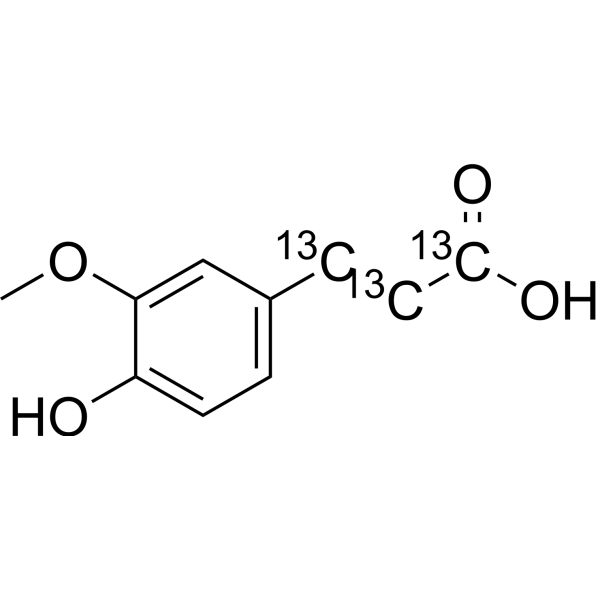
- HY-W770183
-
|
|
Isotope-Labeled Compounds
|
Others
|
|
Uric acid- 13C3 is 13C-labeled Uric acid (HY-B2130). Uric acid is the end product of purine metabolism in the human body. Uric acid can scavenge reactive oxygen species (ROS), such as singlet oxygen and peroxynitrite, and inhibit lipid peroxidation.
|
-
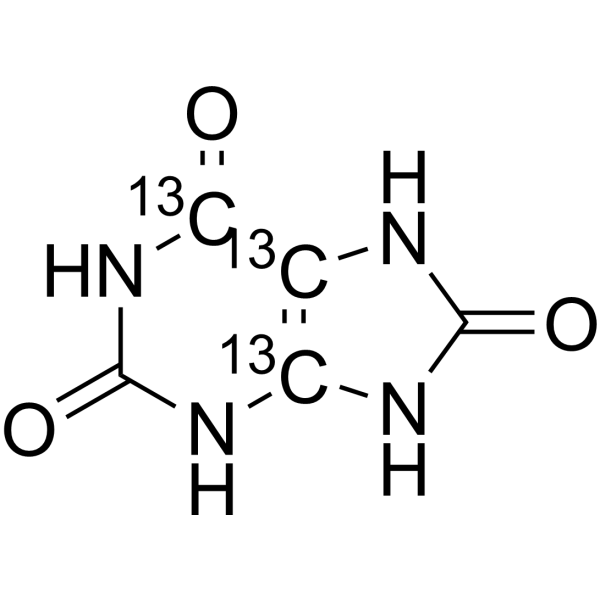
- HY-12481
-
SAR405
Maximum Cited Publications
18 Publications Verification
|
PI3K
Autophagy
|
Cancer
|
|
SAR405 is a first-in-class, selective, and ATP-competitive PI3K class III (PIK3C3) isoform Vps34 inhibitor (IC50=1.2 nM; Kd=1.5 nM). SAR405 inhibits autophagy induced either by starvation or by mTOR inhibition. Anticancer activity .
|
-
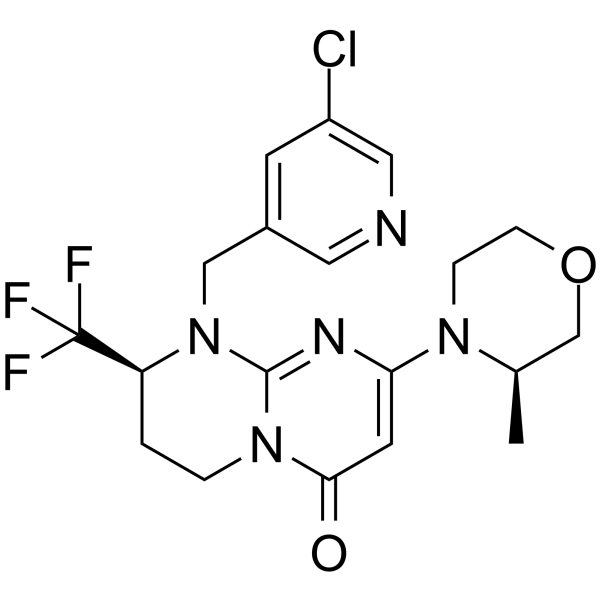
- HY-N0001S
-
-
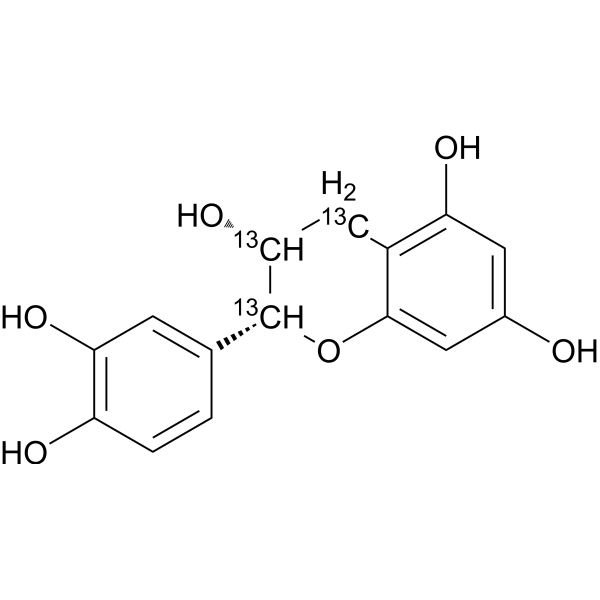
- HY-N7091S1
-
|
|
Isotope-Labeled Compounds
|
Metabolic Disease
|
|
Atrazine- 13C3, 15N3 is the 13C-labeled and 15N-labeled Atrazine. Atrazine is principally used for control of certain annual broadleaf and grass weeds. Atrazine inhibits photophosphorylation but typically does not result in lethality or permanent cell damage in the short term[1].
|
-
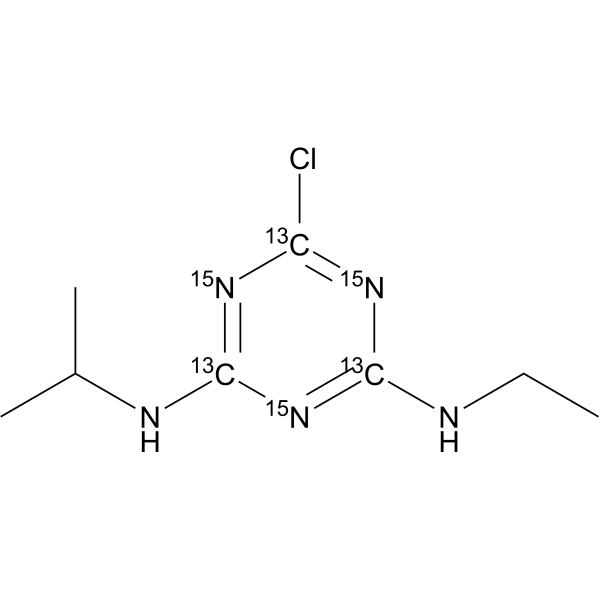
- HY-13632S1
-
|
|
Isotope-Labeled Compounds
Cytochrome P450
|
Endocrinology
Cancer
|
|
Exemestane- 13C3 is the 13C-labeled Exemestane. Exemestane (FCE 24304) is a selective, irreversible and orally active steroidal aromatase inhibitor with IC50s of 30 nM and 40 nM for human placental and rat ovarian aromatase, respectively. Exemestane can be used for hormone-dependent breast cancer research[1][2].
|
-
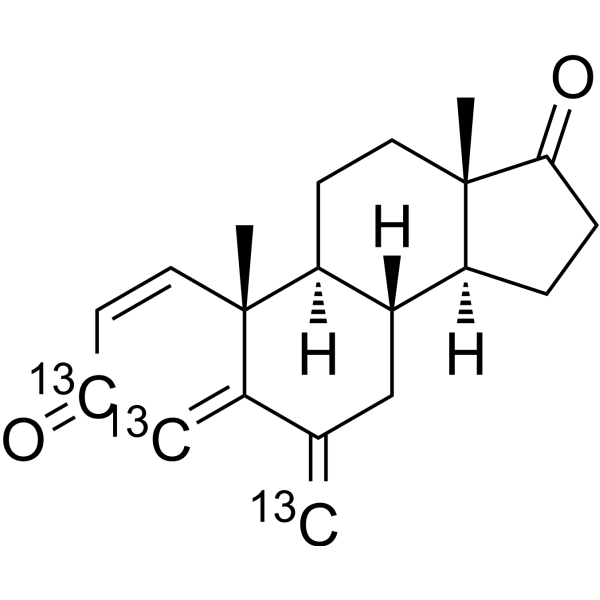
- HY-127105
-
|
LNP023
|
Complement System
|
Metabolic Disease
Inflammation/Immunology
|
|
Iptacopan (LNP023) is a first-in-class, orally bioavailable, highly potent and highly selective factor B inhibitor with an IC50 value of 10 nM. Iptacopan shows direct, reversible, and high-affinity binding to human factor B with a KD of 7.9 nM. Iptacopan targets the underlying cause of complement 3 glomerulopathy (C3G) .
|
-
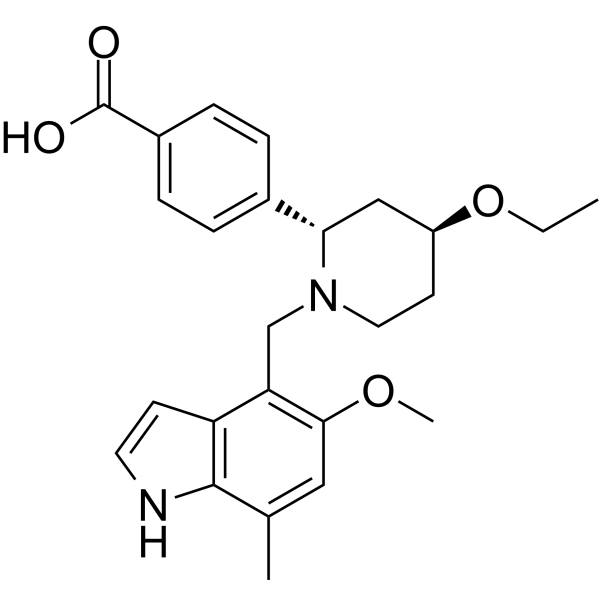
- HY-B0150S1
-
|
Niacinamide-15N,13C3; Nicotinic acid amide-15N,13C3
|
Endogenous Metabolite
Sirtuin
|
Neurological Disease
Cancer
|
|
Nicotinamide- 15N, 13C3 is the 13C-labeled and 15N-labeled Nicotinamide. Nicotinamide is a form of vitamin B3 that plays essential roles in cell physiology through facilitating NAD+ redox homeostasis and providing NAD+ as a substrate to a class of enzymes that catalyze non-redox reactions. Nicotinamide is an inhibitor of SIRT1.
|
-
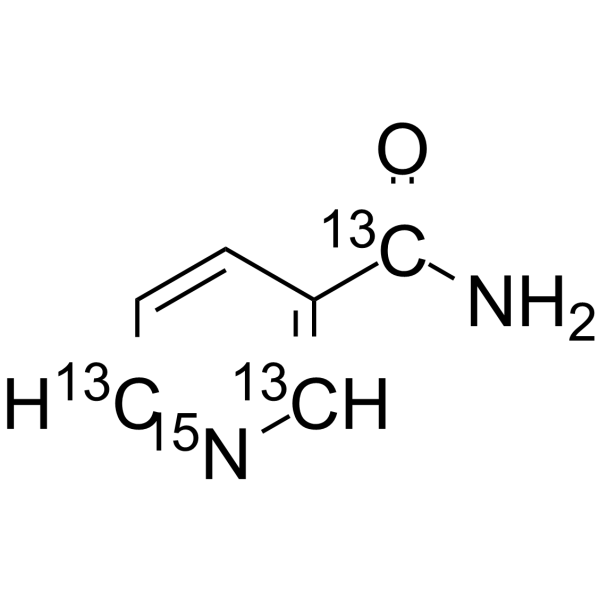
- HY-W324220
-
|
|
11β-HSD
|
Metabolic Disease
|
|
11β-HSD1-IN-10 (compound c3a) is a potent 11β-HSD1 inhibitor (IC50=1.8 µM for human). 11β-HSD1-IN-10 can be used in studies of obesity, hyperglycemia and cognitive impairment .
|
-
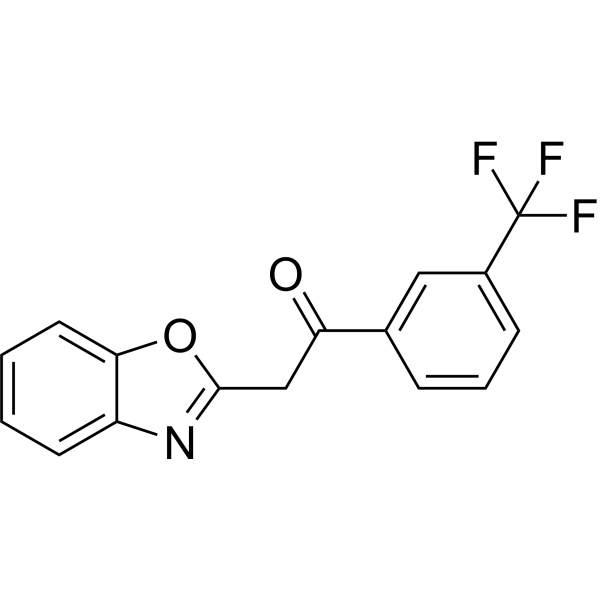
- HY-B0510S3
-
|
|
Isotope-Labeled Compounds
|
Others
|
|
Trimethoprim- 13C3is the deuterium labeledTrimethoprim(HY-B0510) . Trimethoprim is a bacteriostatic antibiotic and an orally active dihydrofolate reductase inhibitor. Trimethoprim is active against a wide range of Gram-positive and Gram-negative aerobic bacteria. Trimethoprim has the potential for the research of urinary tract infections, Shigellosis and Pneumocystis pneumonia. Trimethoprim can inhibit infection of Influenza A virus in chick embryo when combinated with zinc .
|
-
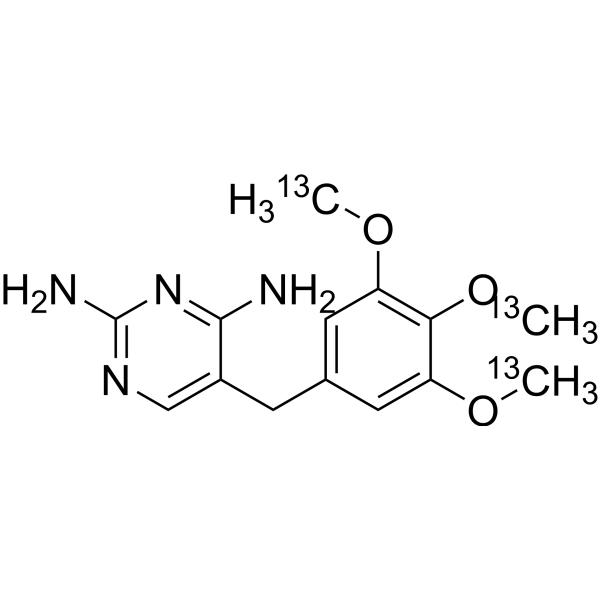
- HY-B0495S4
-
|
LTG-13C3; BW430C-13C3
|
Sodium Channel
Autophagy
|
Neurological Disease
|
|
Lamotrigine- 13C3 is the 13C-labeled Lamotrigine. Lamotrigine (BW430C) is a potent and orally active anticonvulsant or antiepileptic agent. Lamotrigine selectively blocks voltage-gated Na+ channels, stabilizing presynaptic neuronal membranes and inhibiting glutamate release. Lamotrigine can be used for the research of epilepsy, focal seizure, et al[1][2].
|
-
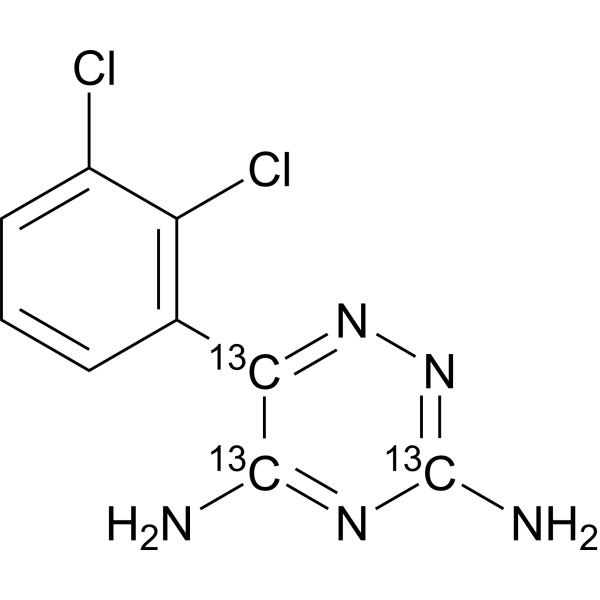
- HY-13653S
-
|
|
Oxidative Phosphorylation
Autophagy
Reactive Oxygen Species
HIV
Ferroptosis
Mitochondrial Metabolism
Endogenous Metabolite
|
Cancer
|
|
(+/-)-Epigallocatechin Gallate- 13C3 is the 13C-labeled (-)-Epigallocatechin Gallate. (-)-Epigallocatechin Gallate is a tea flavonoid with potent antioxidant, antiinflammatory, and anticarcinogenic properties. (-)-Epigallocatechin Gallate is reported to inhibit EGFR signaling and thereby exert anticancer effects[1]. (-)-Epigallocatechin Gallate (EGCG) is a glutamate dehydrogenase 1/2 (GDH1/2, GLUD1/2) inhibitor. Epigallocatechin-3-gallate induces oxidative phosphorylation (OXPHOS) by activating cytochrome c oxidase.
|
-
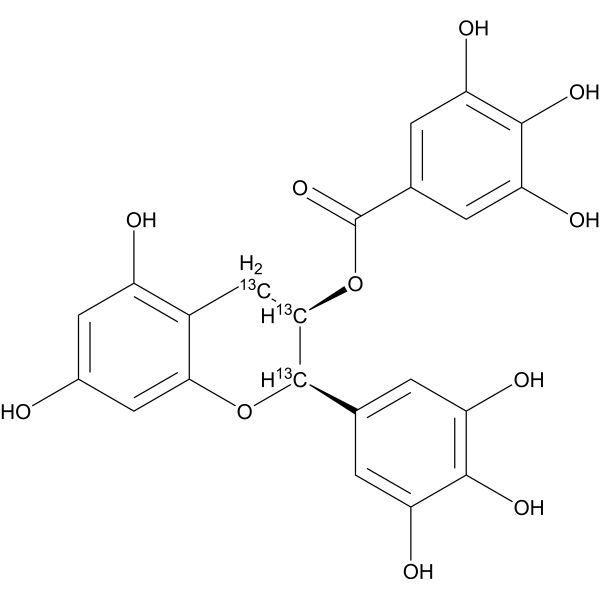
- HY-N0376
-
|
|
Reactive Oxygen Species
|
Neurological Disease
Inflammation/Immunology
Cancer
|
|
Liquiritin, a flavonoid isolated from Glycyrrhiza uralensis, is a potent and competitive AKR1C1 inhibitor with IC50s of 0.62 μM, 0.61 μM, and 3.72μM for AKR1C1, AKR1C2 and AKR1C3, respectively. Liquiritin efficiently inhibits progesterone metabolism mediated by AKR1C1 in vivo . Liquiritin acts as an antioxidant and has neuroprotective, anti-cancer and anti-inflammatory activity .
|
-
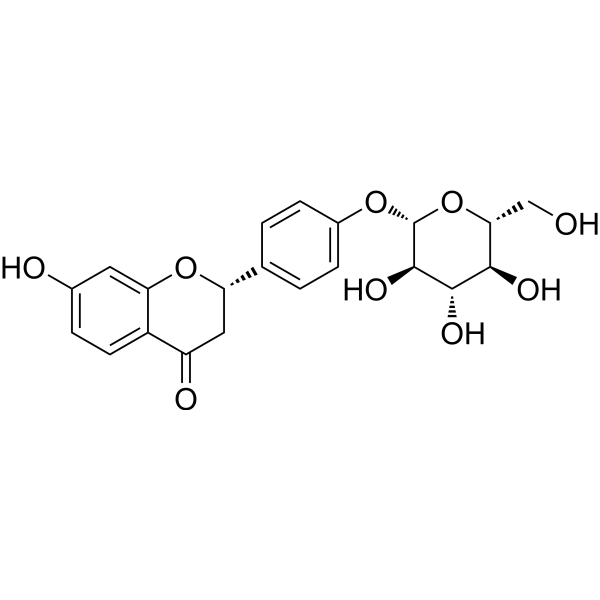
- HY-18085S2
-
-
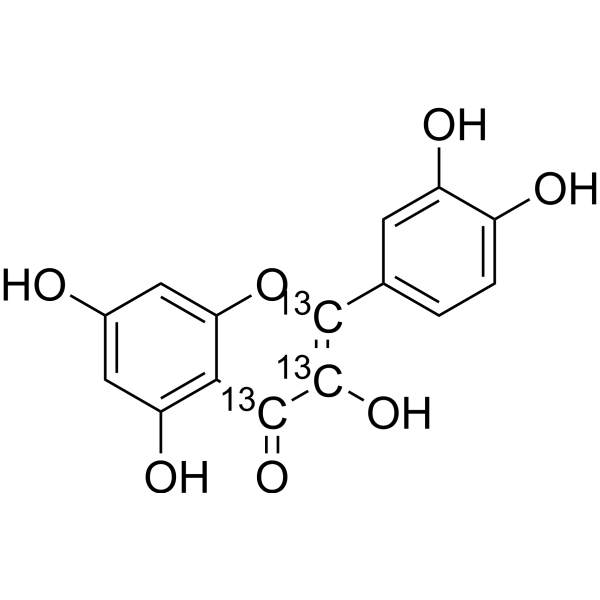
- HY-B1075AS
-
|
MK-0955 (benzylamine)-13C3
|
Bacterial
Antibiotic
|
Infection
|
|
(Rac)-Fosfomycin (benzylamine)- 13C3 is the 13C labeled Fosfomycin[1]. Fosfomycin (MK-0955) is a broad-spectrum antibiotic. Fosfomycin can cross blood-brain barrier penetrating, and irreversibly inhibits an early stage in cell wall synthesis. Fosfomycin shows anti-bacteria activity for a range of bacteria, including multidrug-resistant (MDR), extensively drug-resistant (XDR), and pan-drug-resistant (PDR) bacteria[2][3].
|
-
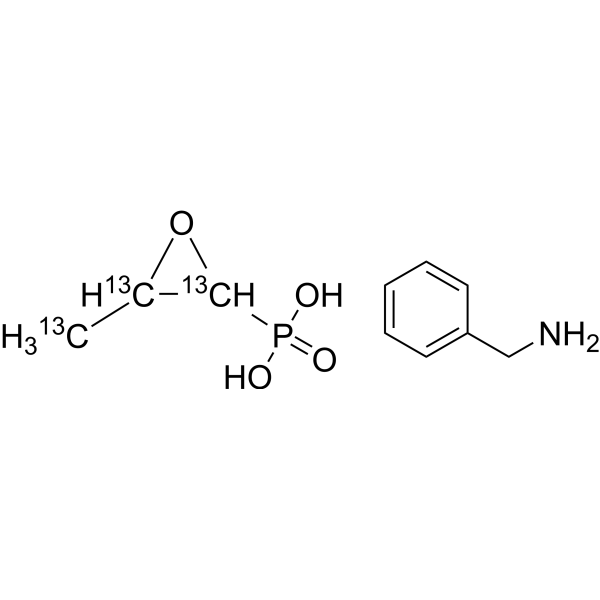
- HY-P1142S1
-
|
|
Isotope-Labeled Compounds
|
Others
|
|
GLP-2(rat) (Ala- 13C3, 15N) TFA is 13C and 15N labeled GLP-2(rat) (HY-P1142). GLP-2(rat) is an intestinal growth factor. GLP-2(rat) stimulates cell proliferation and inhibits apoptosis. GLP-2(rat) enhances mucosal mass and function in residual small intestine after massive small bowel resection (MSBR).
|
-

- HY-P1142S
-
|
|
Isotope-Labeled Compounds
|
Others
|
|
GLP-2(rat) (Ala- 13C3, 15N) is 13C and 15N labeled GLP-2(rat) (HY-P1142). GLP-2(rat) is an intestinal growth factor. GLP-2(rat) stimulates cell proliferation and inhibits apoptosis. GLP-2(rat) enhances mucosal mass and function in residual small intestine after massive small bowel resection (MSBR).
|
-

- HY-150644
-
|
|
Others
|
Cancer
|
|
S07-2010 is a potent pan-AKR1C (aldo-keto reductase family 1 member C) inhibitor, with IC50 values of 0.19, 0.36, 0.47, and 0.73 μM for AKR1C3, AKR1C4, AKR1C1 and AKR1C2, respectively. S07-2010 induces apoptosis in A549/DDP cells. S07-2010 strengthens the cytotoxicity of chemotherapeutic agents in drug-resistant cells. S07-2010 significantly inhibits the proliferation of drug-resistant cells .
|
-
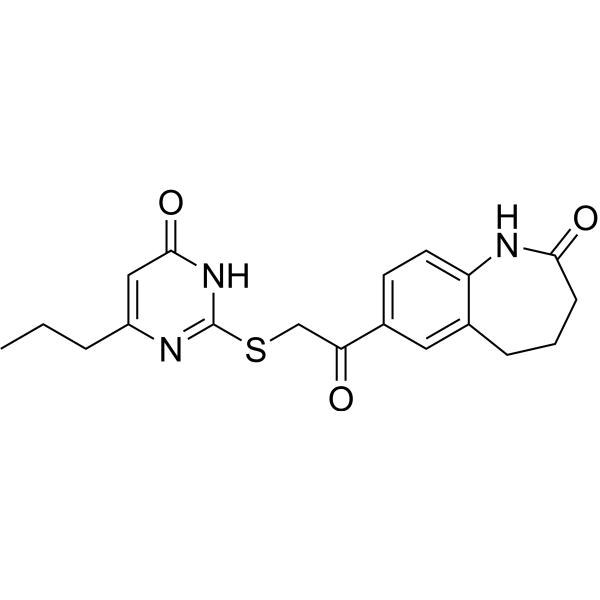
| Cat. No. |
Product Name |
Target |
Research Area |
-
- HY-P1398
-
-
- HY-P1036
-
|
|
Complement System
|
Others
|
|
Compstatin, a 13-residue cyclic peptide, is a potent inhibitor of the complement system C3 with species specificity. Compstatin binds to baboon C3 and is resistant to proteolytic cleavage in baboon blood (similar to humans). Compstatin inhibits only the activation of primates’ complement system. Compstatin exhibits IC50 values of 63 μM and 12 μM for classical and alterative complement pathway, respectively .
|
-
- HY-P1036A
-
|
|
Complement System
|
Others
|
|
Compstatin TFA, a 13-residue cyclic peptide, is a potent inhibitor of the complement system C3 with species specificity. Compstatin TFA binds to baboon C3 and is resistant to proteolytic cleavage in baboon blood (similar to humans). Compstatin TFA inhibits only the activation of primates’ complement system. Compstatin TFA exhibits IC50 values of 63 μM and 12 μM for classical and alterative complement pathway, respectively .
|
-
- HY-P3204
-
|
AL-78898A
|
Complement System
|
Metabolic Disease
|
|
POT-4 (AL-78898A), a Compstatin derivative, is a potent inhibitor of complement factor C3 activation. POT-4 can be used for age-related macular degeneration research
|
-
- HY-P1398A
-
-
- HY-P3204A
-
|
AL-78898A TFA
|
Complement System
|
Metabolic Disease
|
|
POT-4 TFA (AL-78898A TFA), a Compstatin derivative, is a potent inhibitor of complement factor C3 activation. POT-4 TFA can be used for age-related macular degeneration research .
|
-
- HY-P1717
-
|
Cp40
|
Complement System
SARS-CoV
|
Inflammation/Immunology
|
|
AMY-101 (Cp40), a peptidic inhibitor of the central complement component C3 (KD = 0.5 nM), inhibits naturally occurring periodontitis in non-human primates (NHPs). AMY-101 (Cp40) exhibits a favorable anti-inflammatory activity in models with COVID-19 severe pneumonia with systemic hyper inflammation .
|
-
- HY-P1717B
-
|
Cp40 acetate
|
Complement System
SARS-CoV
|
Inflammation/Immunology
|
|
AMY-101 acetate (Cp40 acetate), a peptidic inhibitor of the central complement component C3 (KD = 0.5 nM), inhibits naturally occurring periodontitis in non-human primates (NHPs). AMY-101 acetate (Cp40 acetate) exhibits a favorable anti-inflammatory activity in models with COVID-19 severe pneumonia with systemic hyper inflammation .
|
-
- HY-P1717A
-
|
Cp40 TFA
|
Complement System
SARS-CoV
|
Inflammation/Immunology
|
|
AMY-101 TFA (Cp40 TFA), a peptidic inhibitor of the central complement component C3 (KD = 0.5 nM), inhibits naturally occurring periodontitis in non-human primates (NHPs). AMY-101 (Cp40) exhibits a favorable anti-inflammatory activity in models with COVID-19 severe pneumonia with systemic hyper inflammation .
|
-
- HY-P2141A
-
|
|
Angiotensin Receptor
Arrestin
|
Cardiovascular Disease
|
|
TRV120027 TFA, a β-arrestin-1-biased agonist of the angiotensin II receptor type 1 (AT1R), engages ß-arrestins while blocking G-protein signaling . TRV120027 TFA induces acute catecholamine secretion through cation channel subfamily C3 (TRPC3) coupling, promotes the formation of a macromolecular complex composed of AT1R–β-arrestin-1–TRPC3–PLCγ at the plasma membrane. TRV120027 TFA inhibits angiotensin II–mediated vasoconstriction and increases cardiomyocyte contractility. TRV120027 TFA has the potential for the acute decompensated heart failure (ADHF) treatment .
|
-
- HY-P2141
-
|
|
Angiotensin Receptor
Arrestin
|
Cardiovascular Disease
|
|
TRV120027, a β-arrestin-1-biased agonist of the angiotensin II receptor type 1 (AT1R), engages ß-arrestins while blocking G-protein signaling . TRV120027 induces acute catecholamine secretion through cation channel subfamily C3 (TRPC3) coupling, promotes the formation of a macromolecular complex composed of AT1R–β-arrestin-1–TRPC3–PLCγ at the plasma membrane. TRV120027 inhibits angiotensin II–mediated vasoconstriction and increases cardiomyocyte contractility. TRV120027 has the potential for the acute decompensated heart failure (ADHF) treatment .
|
-
- HY-P1142S1
-
|
|
Isotope-Labeled Compounds
|
Others
|
|
GLP-2(rat) (Ala- 13C3, 15N) TFA is 13C and 15N labeled GLP-2(rat) (HY-P1142). GLP-2(rat) is an intestinal growth factor. GLP-2(rat) stimulates cell proliferation and inhibits apoptosis. GLP-2(rat) enhances mucosal mass and function in residual small intestine after massive small bowel resection (MSBR).
|
-
- HY-P1142S
-
|
|
Isotope-Labeled Compounds
|
Others
|
|
GLP-2(rat) (Ala- 13C3, 15N) is 13C and 15N labeled GLP-2(rat) (HY-P1142). GLP-2(rat) is an intestinal growth factor. GLP-2(rat) stimulates cell proliferation and inhibits apoptosis. GLP-2(rat) enhances mucosal mass and function in residual small intestine after massive small bowel resection (MSBR).
|
| Cat. No. |
Product Name |
Target |
Research Area |
-
- HY-P990025
-
|
ARGX-117
|
Inhibitory Antibodies
|
Inflammation/Immunology
|
|
Empasiprubart (ARGX-117) a humanized inhibitory monoclonal antibody against complement C2. Empasiprubart prevents the formation of the C3 proconvertase and inhibits classical and lectin pathway activation upstream of C3 activation through binding to the Sushi-2 domain of C2. Empasiprubart exhibits pH- and calcium-dependent target binding. Empasiprubart prevents complement-mediated cytotoxicity in in vitro models for autoimmune hemolytic anemia and antibody-mediated rejection of organ transplants .
|
-
- HY-P99050
-
-
- HY-P990091
-
|
SAR 445088
|
Complement System
|
Inflammation/Immunology
|
|
Riliprubart (SAR445088) is an anti-C1s humanized monoclonal antibody that inhibits activated C1s in the proximal portion of the classical complement system. Riliprubart selectively inhibits activated C1s and prevents the enzymatic action of C1 on its substrates C4 and C2, thus inhibiting the formation of the classical pathway C3 convertase, C4b2a .
|
-
- HY-P990216
-
|
|
Inhibitory Antibodies
|
Others
|
|
Anti-Mouse IL-25 Antibody (2C3) is a mouse-derived IgG1, κ type antibody inhibitor, targeting to mouse IL-25.
|
| Cat. No. |
Product Name |
Category |
Target |
Chemical Structure |
| Cat. No. |
Product Name |
Chemical Structure |
-
- HY-B0526S
-
|
|
|
Flumequine- 13C3 is the 13C3 labeled Flumequine. Flumequine (R-802) is a quinolone antibiotic, and acts as a topoisomerase II inhibitor, with an IC50 of 15 μM (3.92 μg/mL).
|
-

-
- HY-14605S
-
|
|
|
Rasagiline- 13C3 ((R)-AGN1135- 13C3; TVP1012- 13C3) mesylateis the deuterium labeledRasagiline (mesylate)(HY-14605) . Rasagiline (R-AGN1135) mesylate is a highly potent selective irreversible mitochondrial monoamine oxidase (MAO) inhibitor with IC50s of 4.43?nM and 412?nM for rat brain MAO B and A activity, respectively .
|
-

-
- HY-14605BS
-
|
|
|
Rasagiline- 13C3 (mesylate racemic) is a 13C-labeled Rasagiline mesylate racemic. Rasagiline mesylate racemic is a highly potent selective irreversible mitochondrial monoamine oxidase (MAO) inhibitor[1]. Rasagiline-13C3 (mesylate racemic) is a click chemistry reagent, it contains an Alkyne group and can undergo copper-catalyzed azide-alkyne cycloaddition (CuAAc) with molecules containing Azide groups.
|
-

-
- HY-B0166S4
-
|
|
|
L-Ascorbic acid- 13C-3 is the 13C labeled L-Ascorbic acid. L-Ascorbic acid (L-Ascorbate), an electron donor, is an endogenous antioxidant agent. L-Ascorbic acid inhibits selectively Cav3.2 channels with an IC50 of 6.5 μM. L-Ascorbic acid is also a collagen
|
-

-
- HY-N0898S
-
|
|
|
Catechin- 13C3 is the 13C-labeled Catechin. Catechin ((+)-Catechin) inhibits cyclooxygenase-1 (COX-1) with an IC50 of 1.4 μM.
|
-

-
- HY-B0495S
-
|
|
|
Lamotrigine- 13C3,d3 is the 13C-labeled Lamotrigine. Lamotrigine (BW430C) is a potent and orally active anticonvulsant or antiepileptic agent. Lamotrigine selectively blocks voltage-gated Na+ channels, stabilizing presynaptic neuronal membranes and inhibiting glutamate release. Lamotrigine can be used for the research of epilepsy, focal seizure, et al[1][2].
|
-

-
- HY-12542S
-
|
|
|
Dantrolene- 13C3 is the 13C3 labeled Dantrolene. Dantrolene (F368), a muscle relaxant, non-competitively inhibits human erythrocyte glutathione reductase. Ki and IC50 values are 111.6 μM and 52.3 μM, respectively. Dantrolene is a ryanodine receptor antagonist and Ca2+ signaling stabilizer. Dantrolene can be used for the research of muscle spasticity, malignant hyperthermia, Huntington's disease and other neuroleptic malignant syndrome.
|
-

-
- HY-40354S
-
|
|
|
Tofacitinib- 13C3 is the 13C-labeled Tofacitinib. Tofacitinib is an orally available JAK3/2/1 inhibitor with IC50s of 1, 20, and 112 nM, respectively.
|
-

-
- HY-N0356S
-
|
|
|
(+/-)-Catechin Gallate- 13C3 is the 13C-labeled (-)-Catechin gallate. (-)-Catechin gallate is a minor constituent in green tea catechins. (-)-Catechin gallate inhibits the activity of COX-1 and COX-2 enzymes.
|
-

-
- HY-N0060S1
-
|
|
|
Ferulic acid- 13C3 is the 13C-labeled Ferulic acid. Ferulic acid is a novel fibroblast growth factor receptor 1 (FGFR1) inhibitor with IC50s of 3.78 and 12.5 μM for FGFR1 and FGFR2, respectively.
|
-

-
- HY-W770183
-
|
|
|
Uric acid- 13C3 is 13C-labeled Uric acid (HY-B2130). Uric acid is the end product of purine metabolism in the human body. Uric acid can scavenge reactive oxygen species (ROS), such as singlet oxygen and peroxynitrite, and inhibit lipid peroxidation.
|
-

-
- HY-N0001S
-
|
|
|
(±)-Epicatechin- 13C3 is the 13C labeled (±)-Epicatechin. (-)-Epicatechin (HY-N0001) inhibits cyclooxygenase-1 (COX-1) with an IC50 of 3.2 μM. (-)-Epicatechin inhibits the IL-1β-induced expression of iNOS by blocking the nuclear localization of the p65 subunit of NF-κB[1].
|
-

-
- HY-N7091S1
-
|
|
|
Atrazine- 13C3, 15N3 is the 13C-labeled and 15N-labeled Atrazine. Atrazine is principally used for control of certain annual broadleaf and grass weeds. Atrazine inhibits photophosphorylation but typically does not result in lethality or permanent cell damage in the short term[1].
|
-

-
- HY-13632S1
-
|
|
|
Exemestane- 13C3 is the 13C-labeled Exemestane. Exemestane (FCE 24304) is a selective, irreversible and orally active steroidal aromatase inhibitor with IC50s of 30 nM and 40 nM for human placental and rat ovarian aromatase, respectively. Exemestane can be used for hormone-dependent breast cancer research[1][2].
|
-

-
- HY-B0150S1
-
|
|
|
Nicotinamide- 15N, 13C3 is the 13C-labeled and 15N-labeled Nicotinamide. Nicotinamide is a form of vitamin B3 that plays essential roles in cell physiology through facilitating NAD+ redox homeostasis and providing NAD+ as a substrate to a class of enzymes that catalyze non-redox reactions. Nicotinamide is an inhibitor of SIRT1.
|
-

-
- HY-B0510S3
-
|
|
|
Trimethoprim- 13C3is the deuterium labeledTrimethoprim(HY-B0510) . Trimethoprim is a bacteriostatic antibiotic and an orally active dihydrofolate reductase inhibitor. Trimethoprim is active against a wide range of Gram-positive and Gram-negative aerobic bacteria. Trimethoprim has the potential for the research of urinary tract infections, Shigellosis and Pneumocystis pneumonia. Trimethoprim can inhibit infection of Influenza A virus in chick embryo when combinated with zinc .
|
-

-
- HY-B0495S4
-
|
|
|
Lamotrigine- 13C3 is the 13C-labeled Lamotrigine. Lamotrigine (BW430C) is a potent and orally active anticonvulsant or antiepileptic agent. Lamotrigine selectively blocks voltage-gated Na+ channels, stabilizing presynaptic neuronal membranes and inhibiting glutamate release. Lamotrigine can be used for the research of epilepsy, focal seizure, et al[1][2].
|
-

-
- HY-13653S
-
|
|
|
(+/-)-Epigallocatechin Gallate- 13C3 is the 13C-labeled (-)-Epigallocatechin Gallate. (-)-Epigallocatechin Gallate is a tea flavonoid with potent antioxidant, antiinflammatory, and anticarcinogenic properties. (-)-Epigallocatechin Gallate is reported to inhibit EGFR signaling and thereby exert anticancer effects[1]. (-)-Epigallocatechin Gallate (EGCG) is a glutamate dehydrogenase 1/2 (GDH1/2, GLUD1/2) inhibitor. Epigallocatechin-3-gallate induces oxidative phosphorylation (OXPHOS) by activating cytochrome c oxidase.
|
-

-
- HY-18085S2
-
|
|
|
Quercetin- 13C3 is the 13C-labeled Quercetin. Quercetin, a natural flavonoid, is a stimulator of recombinant SIRT1 and also a PI3K inhibitor with IC50 of 2.4 μM, 3.0 μM and 5.4 μM for PI3K γ, PI3K δ and PI3K β, respectively[1].
|
-

-
- HY-B1075AS
-
|
|
|
(Rac)-Fosfomycin (benzylamine)- 13C3 is the 13C labeled Fosfomycin[1]. Fosfomycin (MK-0955) is a broad-spectrum antibiotic. Fosfomycin can cross blood-brain barrier penetrating, and irreversibly inhibits an early stage in cell wall synthesis. Fosfomycin shows anti-bacteria activity for a range of bacteria, including multidrug-resistant (MDR), extensively drug-resistant (XDR), and pan-drug-resistant (PDR) bacteria[2][3].
|
-

-
- HY-P1142S1
-
|
|
|
GLP-2(rat) (Ala- 13C3, 15N) TFA is 13C and 15N labeled GLP-2(rat) (HY-P1142). GLP-2(rat) is an intestinal growth factor. GLP-2(rat) stimulates cell proliferation and inhibits apoptosis. GLP-2(rat) enhances mucosal mass and function in residual small intestine after massive small bowel resection (MSBR).
|
-

-
- HY-P1142S
-
|
|
|
GLP-2(rat) (Ala- 13C3, 15N) is 13C and 15N labeled GLP-2(rat) (HY-P1142). GLP-2(rat) is an intestinal growth factor. GLP-2(rat) stimulates cell proliferation and inhibits apoptosis. GLP-2(rat) enhances mucosal mass and function in residual small intestine after massive small bowel resection (MSBR).
|
-

| Cat. No. |
Product Name |
|
Classification |
-
- HY-157510
-
|
|
|
Azide
|
|
Thalidomide-O-C3-azide is a click chemistry modification of the cereblon (CRBN) inhibitor Thalidomide (HY-14658). Thalidomide-O-C3-azide contains an azide group and can undergo copper-catalyzed azide-alkyne cycloaddition reaction (CuAAc) with molecules containing alkyne groups. Thalidomide-O-C3-azide can be used as a ligand of E3 ubiquitin ligase and Linker conjugates (E3 Ligase Ligand-Linker Conjugates) for the synthesis of PROTACs .
|
-
- HY-14605BS
-
|
AGN1135-13C3; TVP1012-13C3 racemic
|
|
Alkynes
|
|
Rasagiline- 13C3 (mesylate racemic) is a 13C-labeled Rasagiline mesylate racemic. Rasagiline mesylate racemic is a highly potent selective irreversible mitochondrial monoamine oxidase (MAO) inhibitor[1]. Rasagiline-13C3 (mesylate racemic) is a click chemistry reagent, it contains an Alkyne group and can undergo copper-catalyzed azide-alkyne cycloaddition (CuAAc) with molecules containing Azide groups.
|
Your information is safe with us. * Required Fields.
Inquiry Information
- Product Name:
- Cat. No.:
- Quantity:
- MCE Japan Authorized Agent:





















































































